Abstract
1. Tritiated tetrodotoxin has been prepared and purified, and its binding to rabbit, lobster, and garfish non-myelinated nerve fibres examined.
2. In each case a component of the binding curve was found that saturated at concentrations of a few nanomolar.
3. In addition, non-specific binding, indicated by a linear dependence of the amount bound on concentration, occurred.
4. The kinetics of wash-in and wash-out of the radioactive toxin were consistent with a model in which all binding was rapid and reversible and in which diffusion into and out of the nerve bundle was rate-limiting. This was shown by numerical solution of the appropriate non-linear diffusion equation. An extension of the limited biophase model that allows for non-specific binding was shown to give good semiquantitative approximations to the proper diffusion equation; and (unlike the latter) the extension was shown to have a relatively simple solution.
5. A number of pharmacological agents were tested for competition with, or perturbation of, tetrodotoxin binding: sodium, calcium and hydrogen ions, lidocaine, batrachotoxin and saxitoxin. Apart from a small calcium effect, only saxitoxin, whose effect on sodium current is similar to that of tetrodotoxin, was found to interfere with binding. Increasing saxitoxin concentrations resulted in reduced amounts of tetrodotoxin binding in a manner consistent with a competition between the two toxins for the same site.
Full text
PDF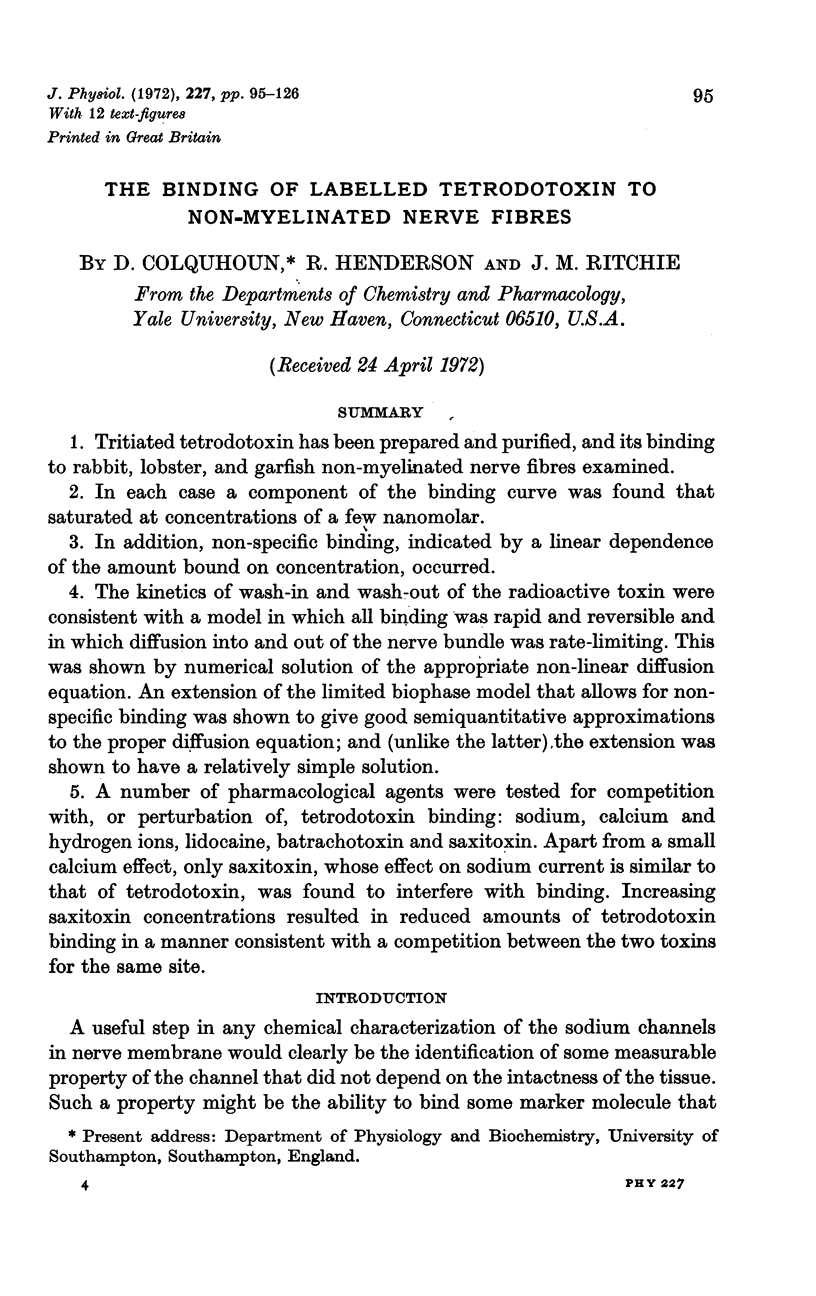
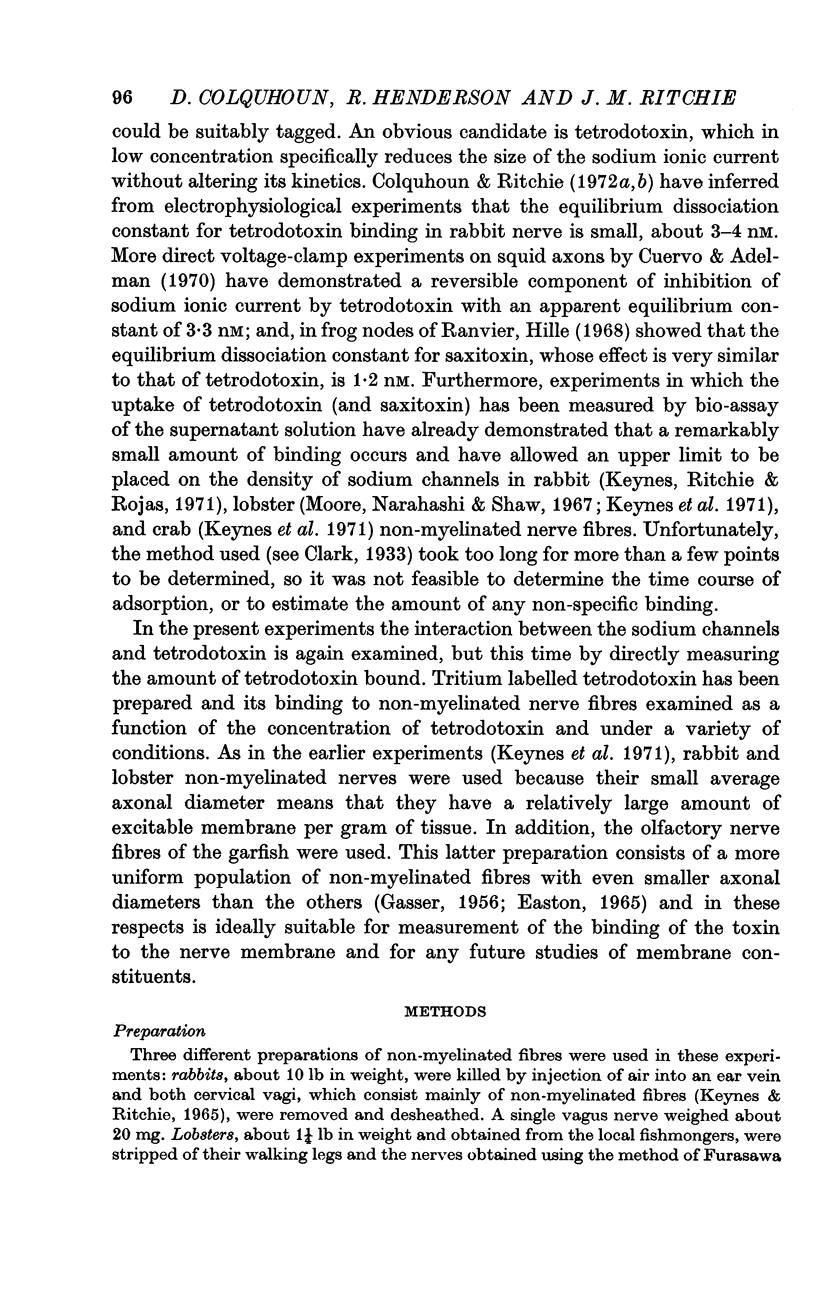
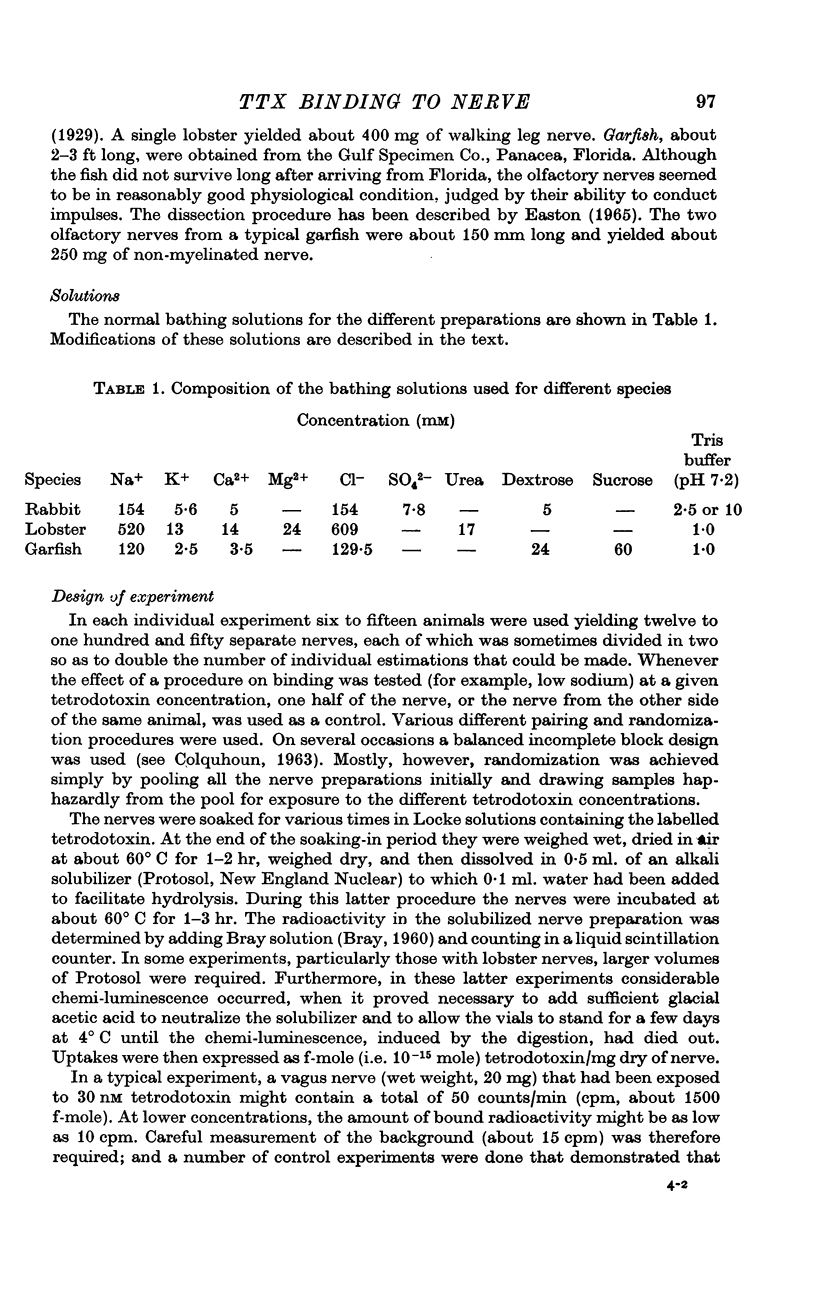
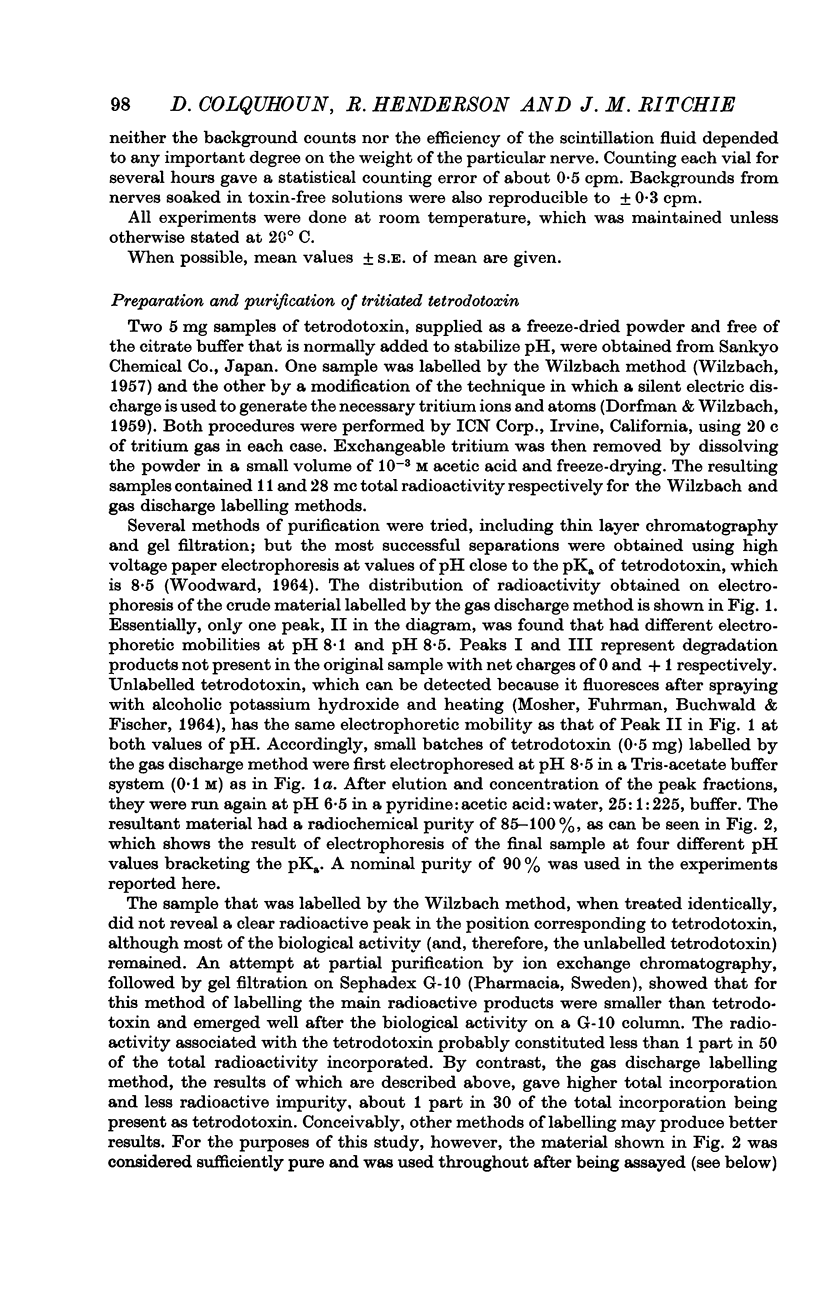
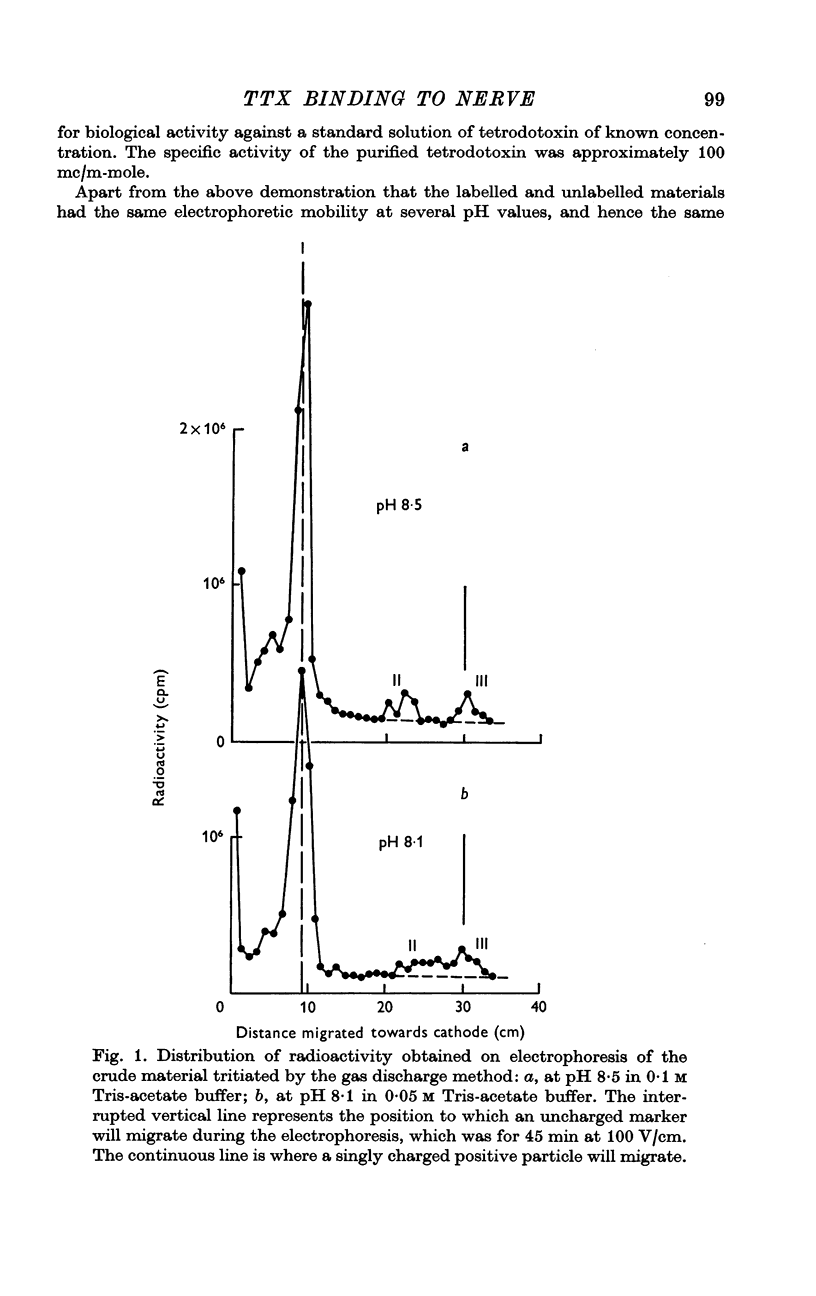
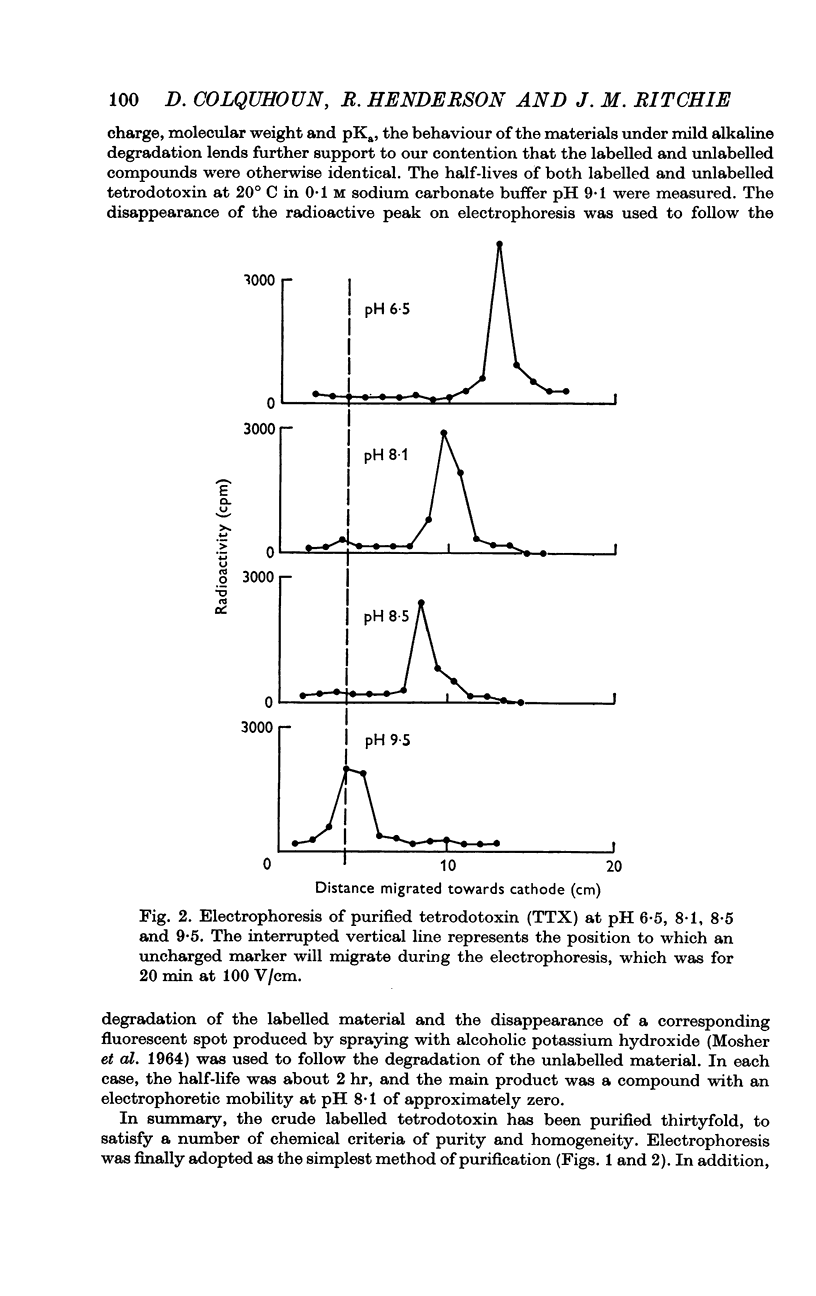
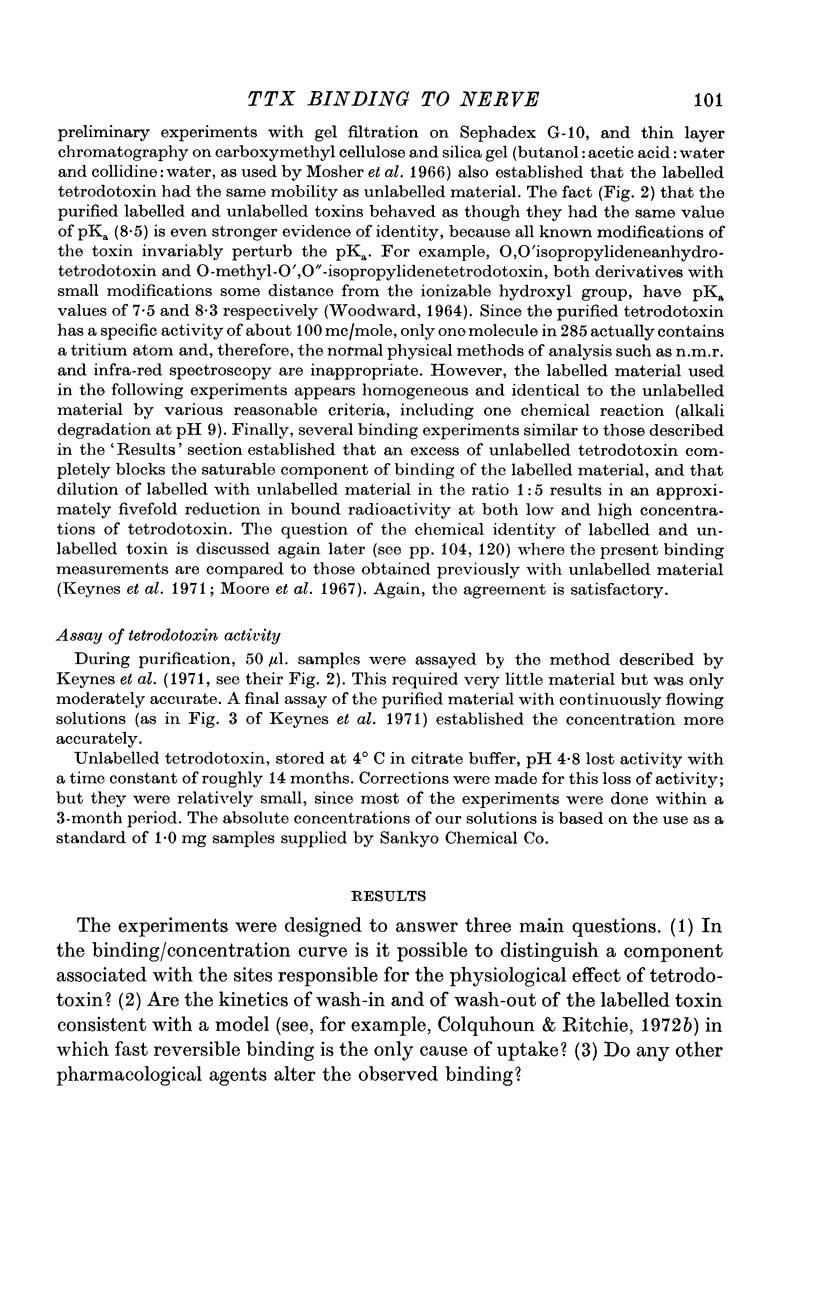
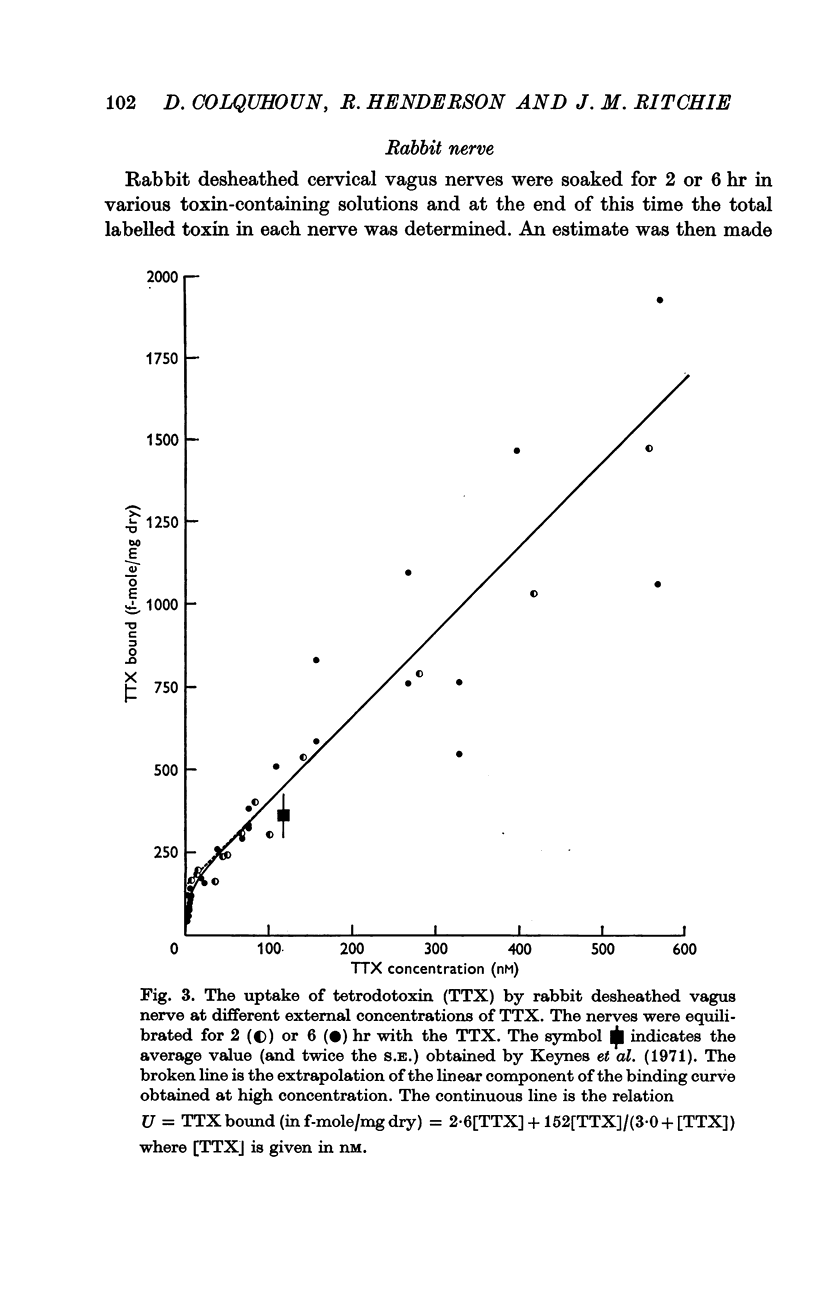
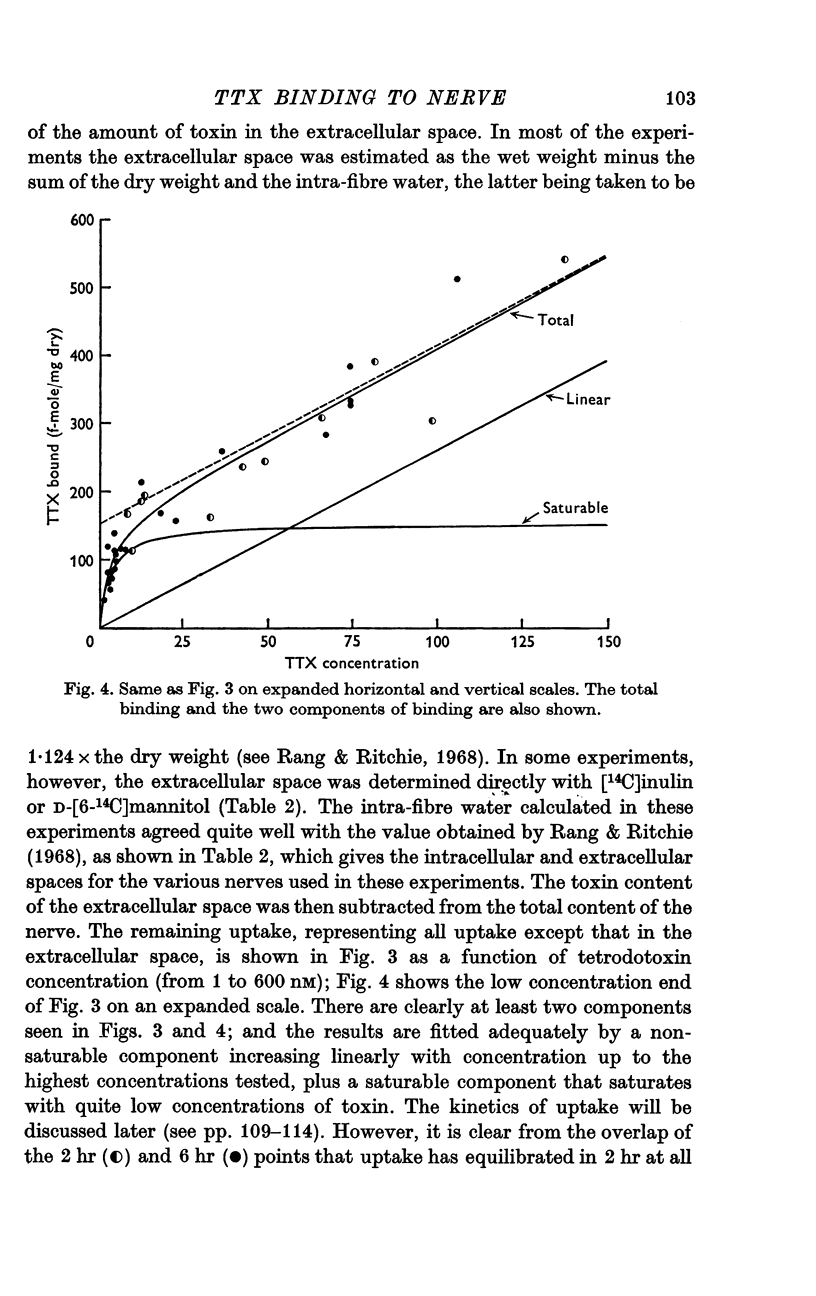
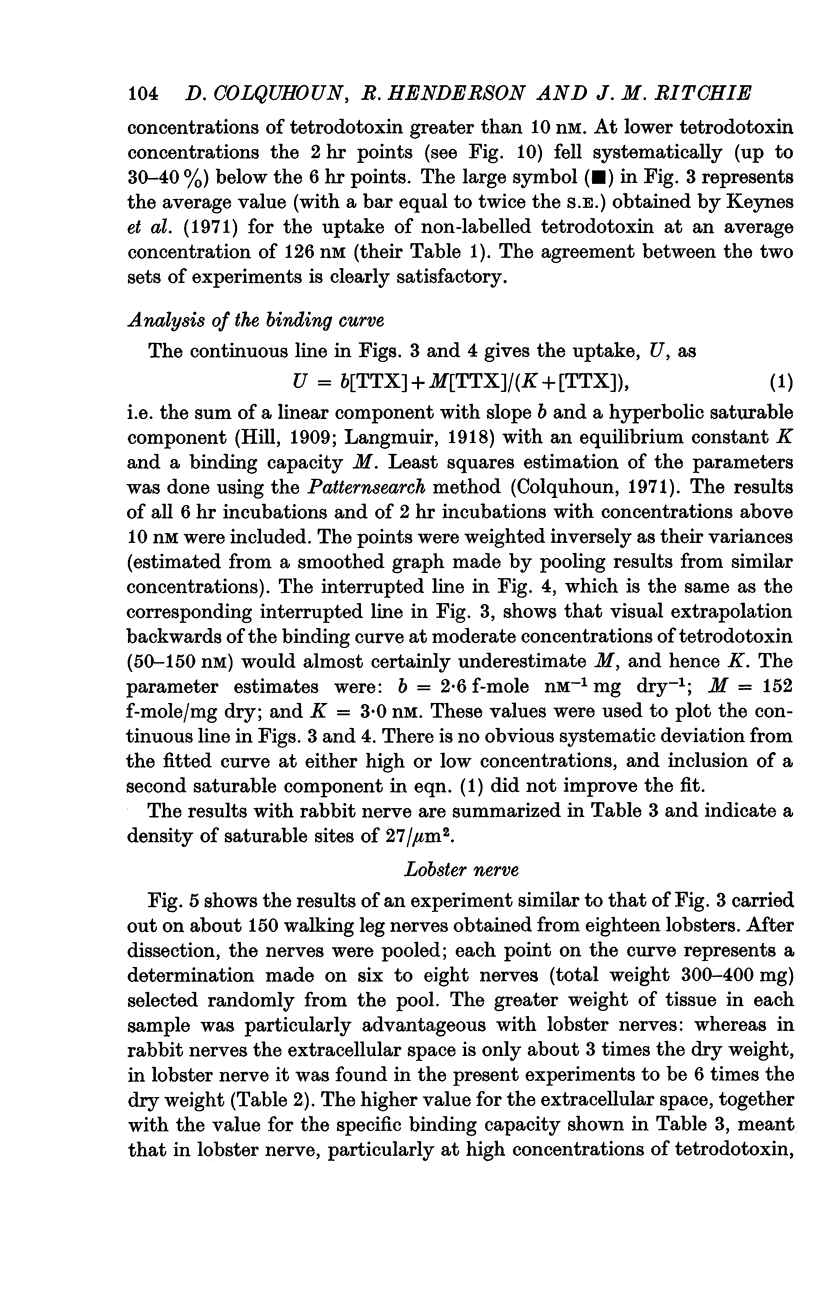
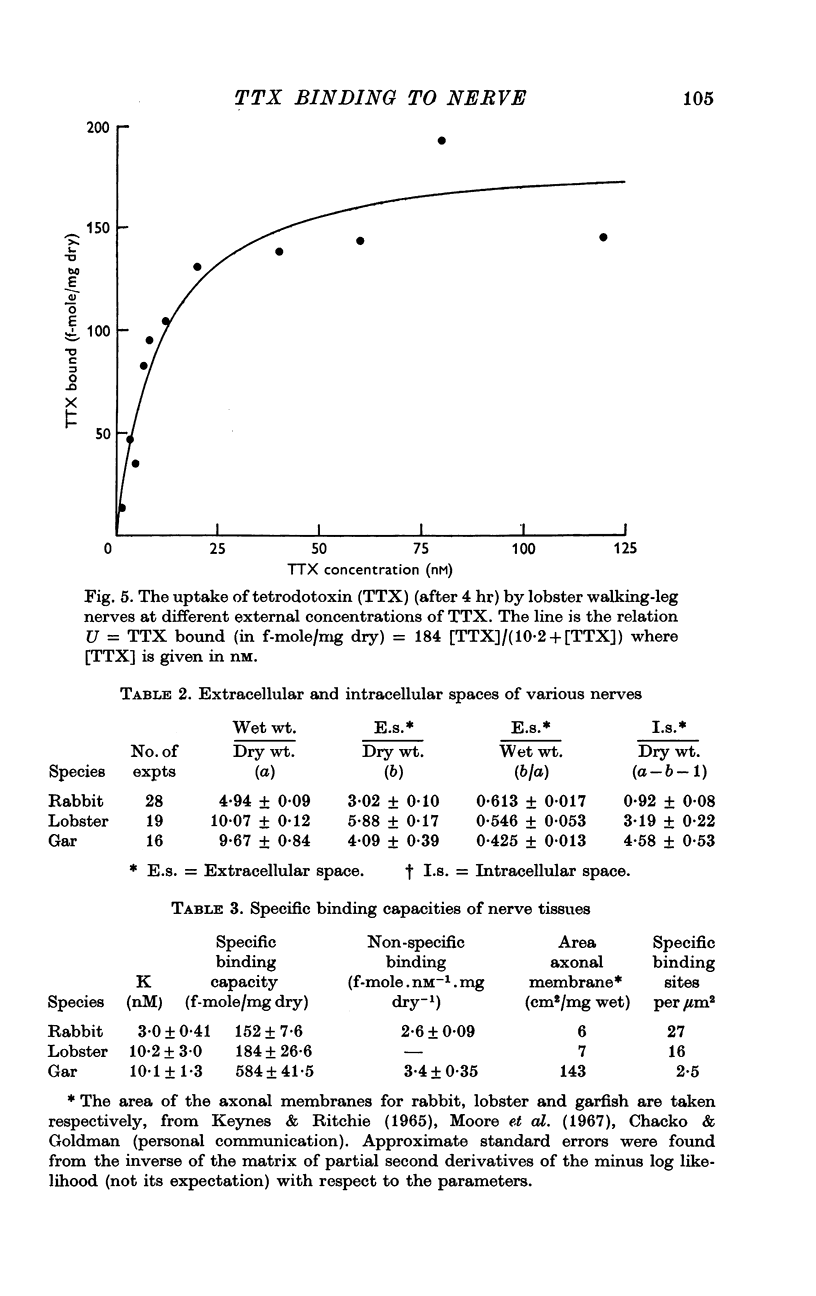
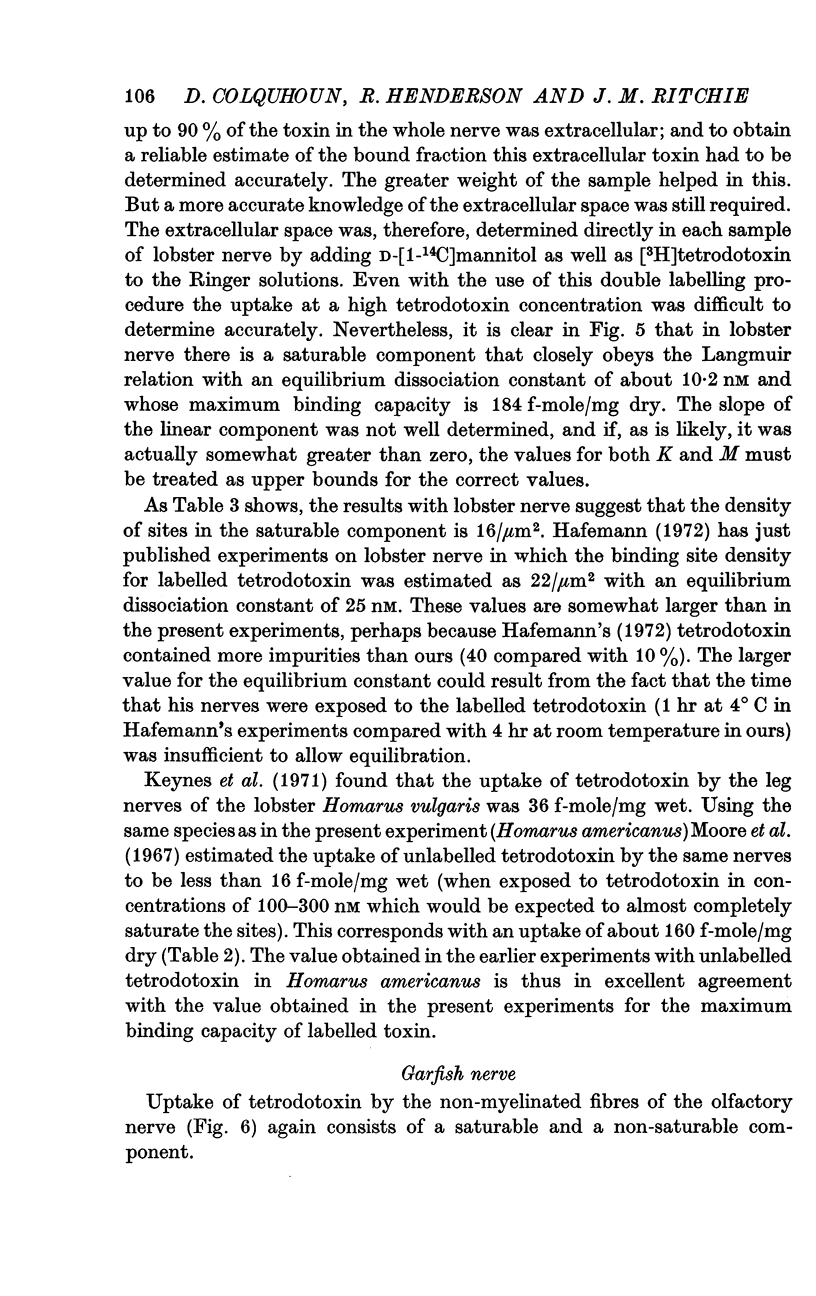
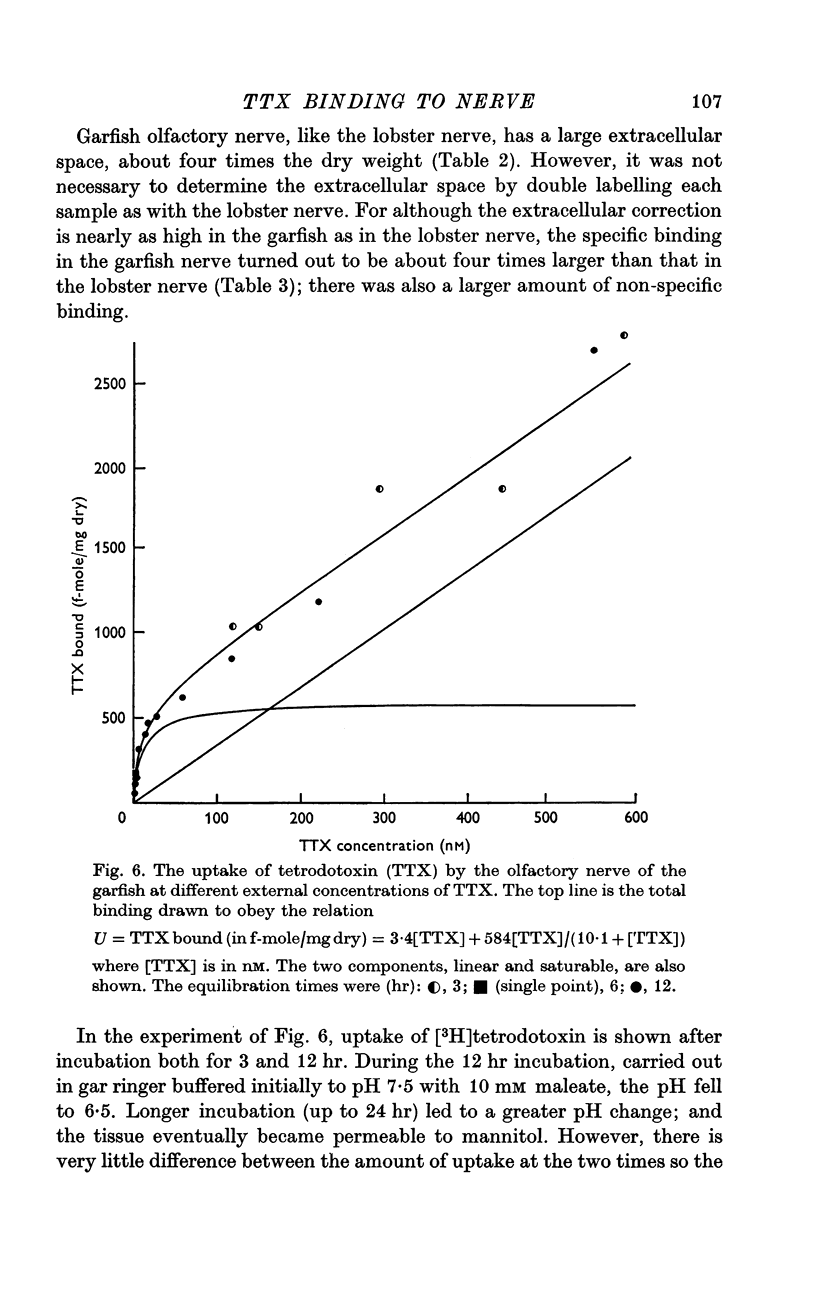
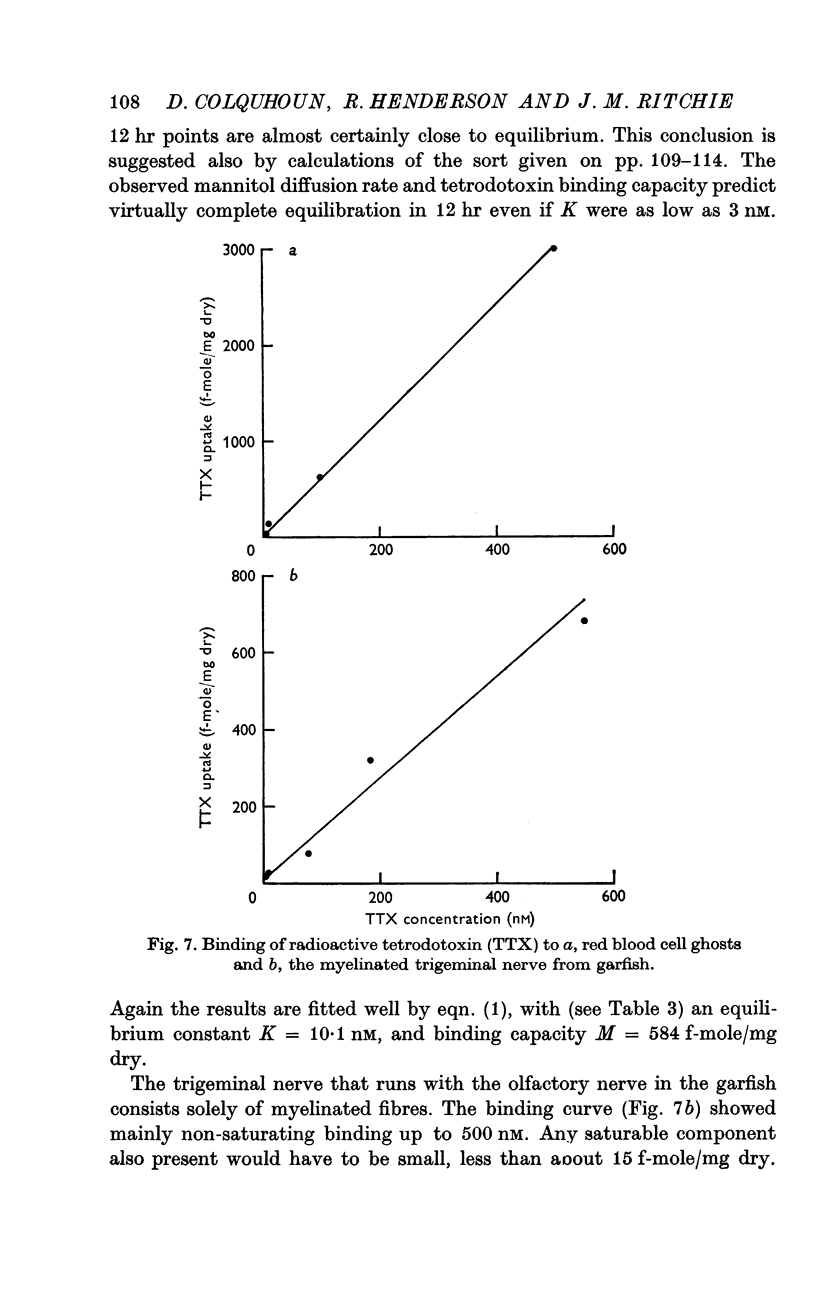
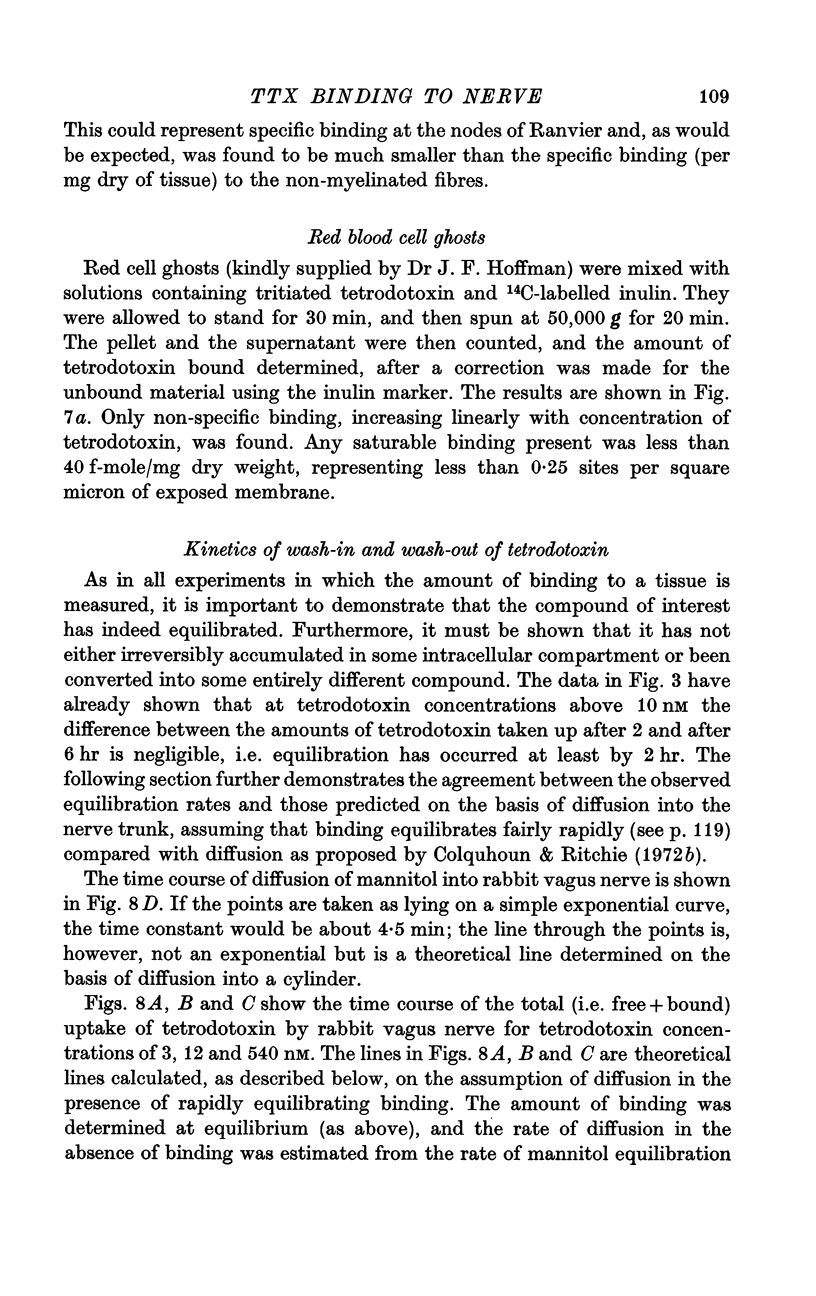
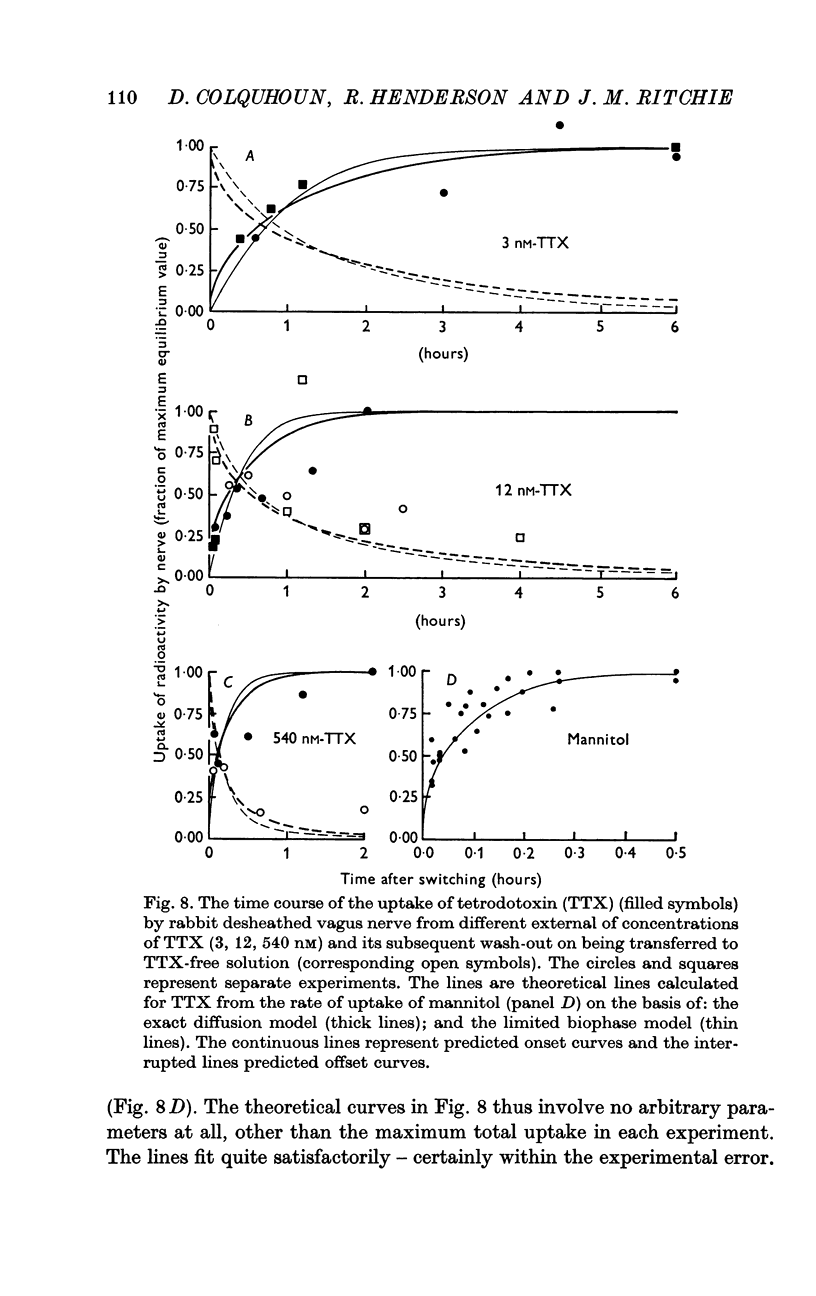
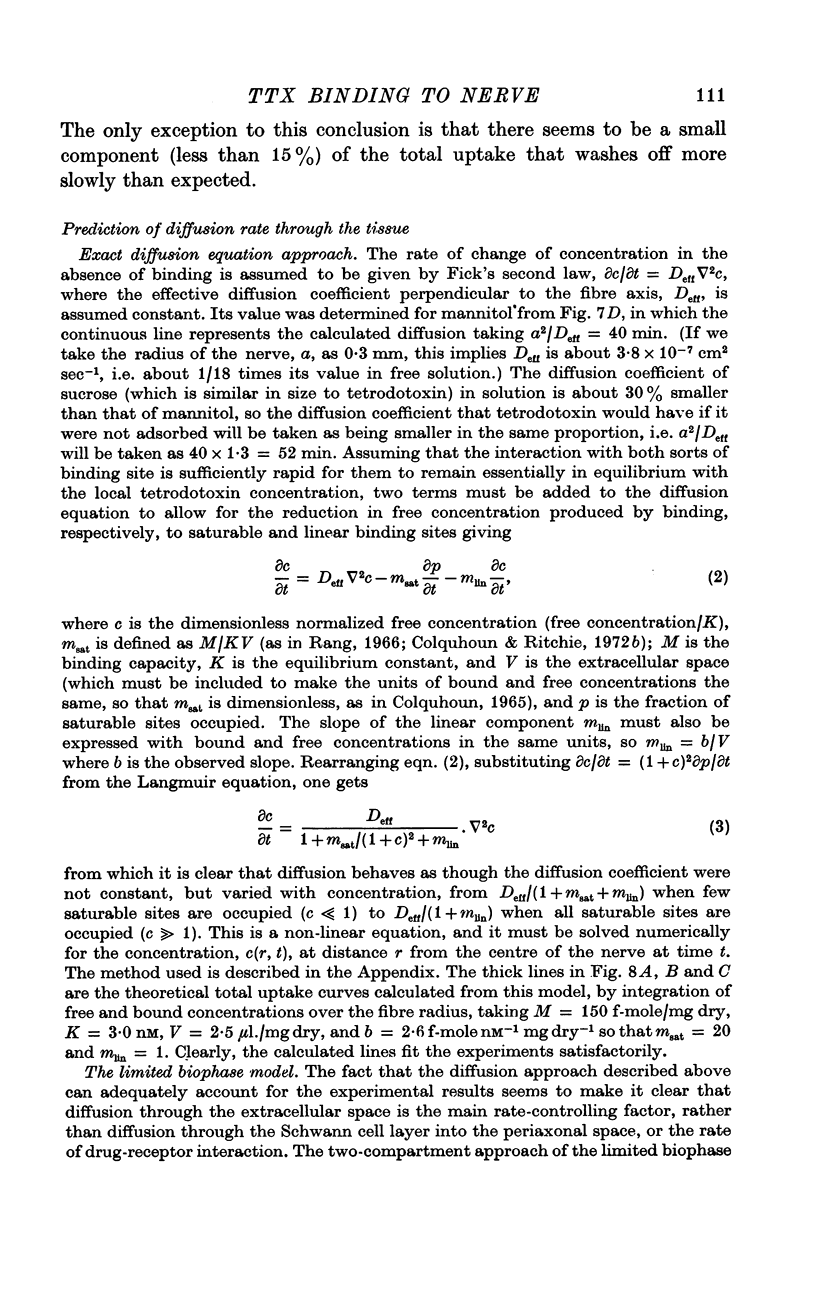
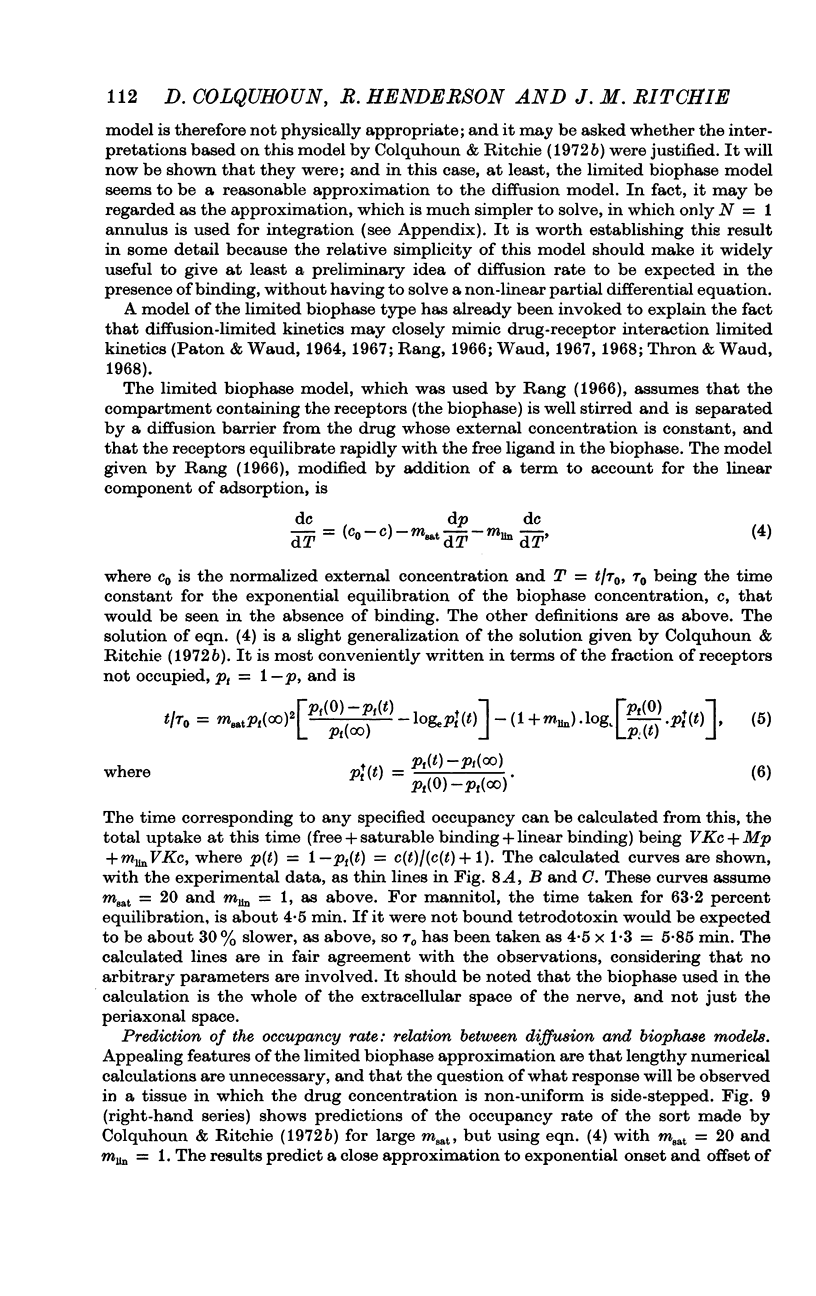
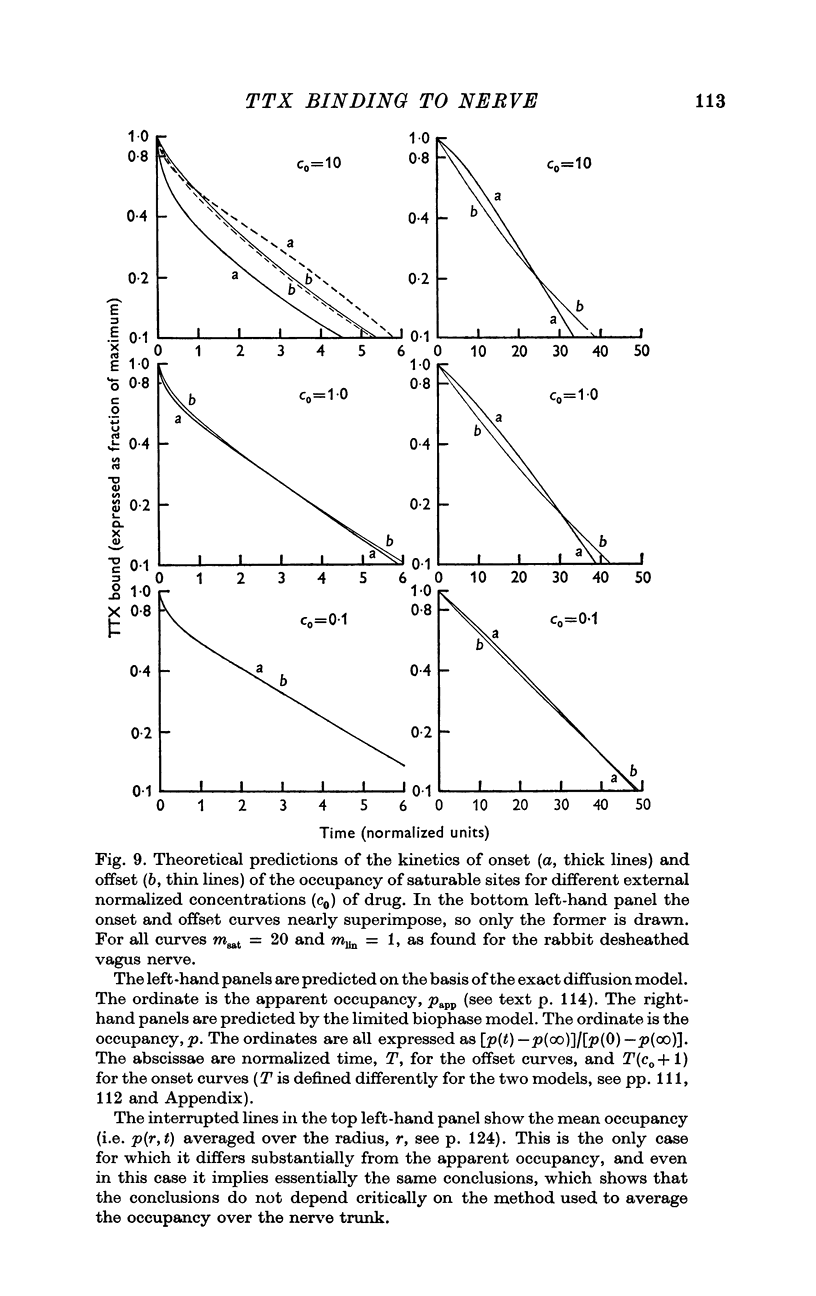
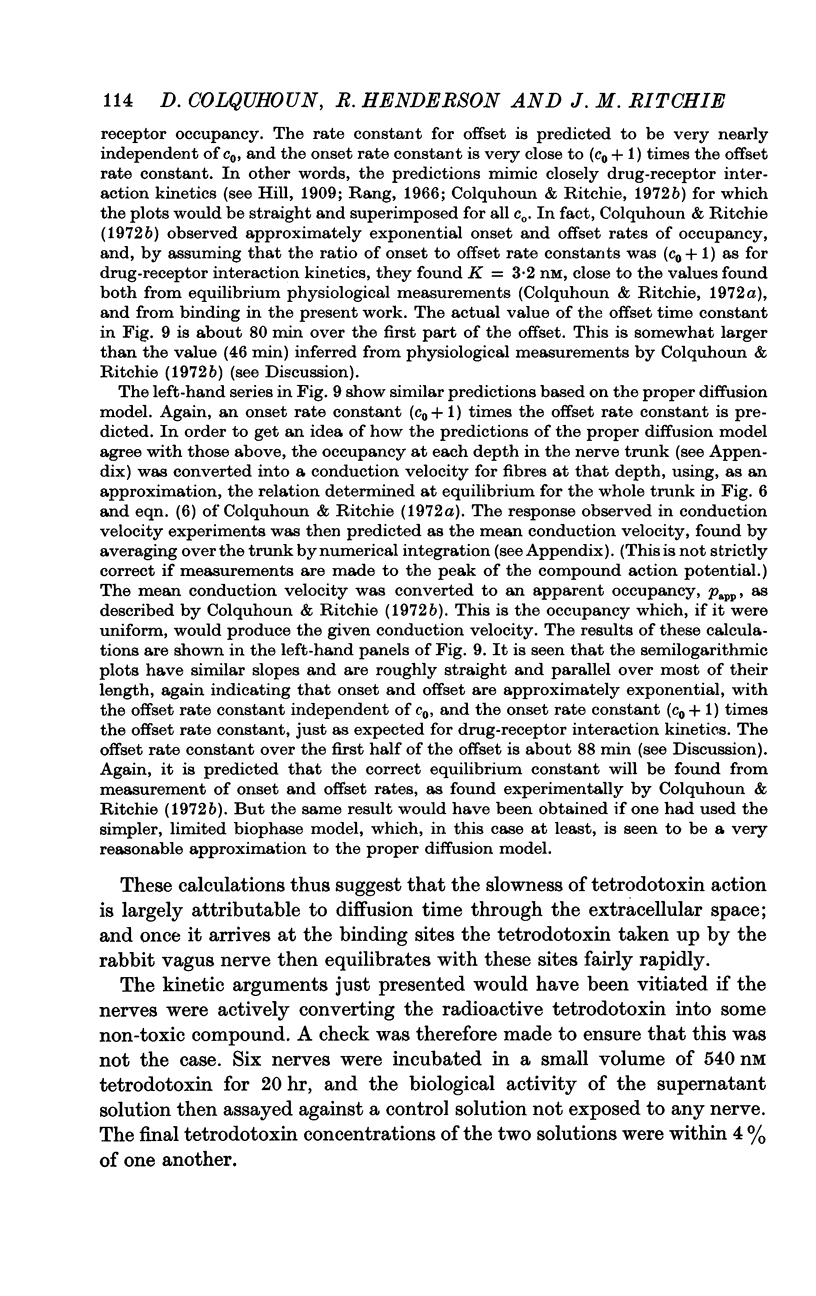
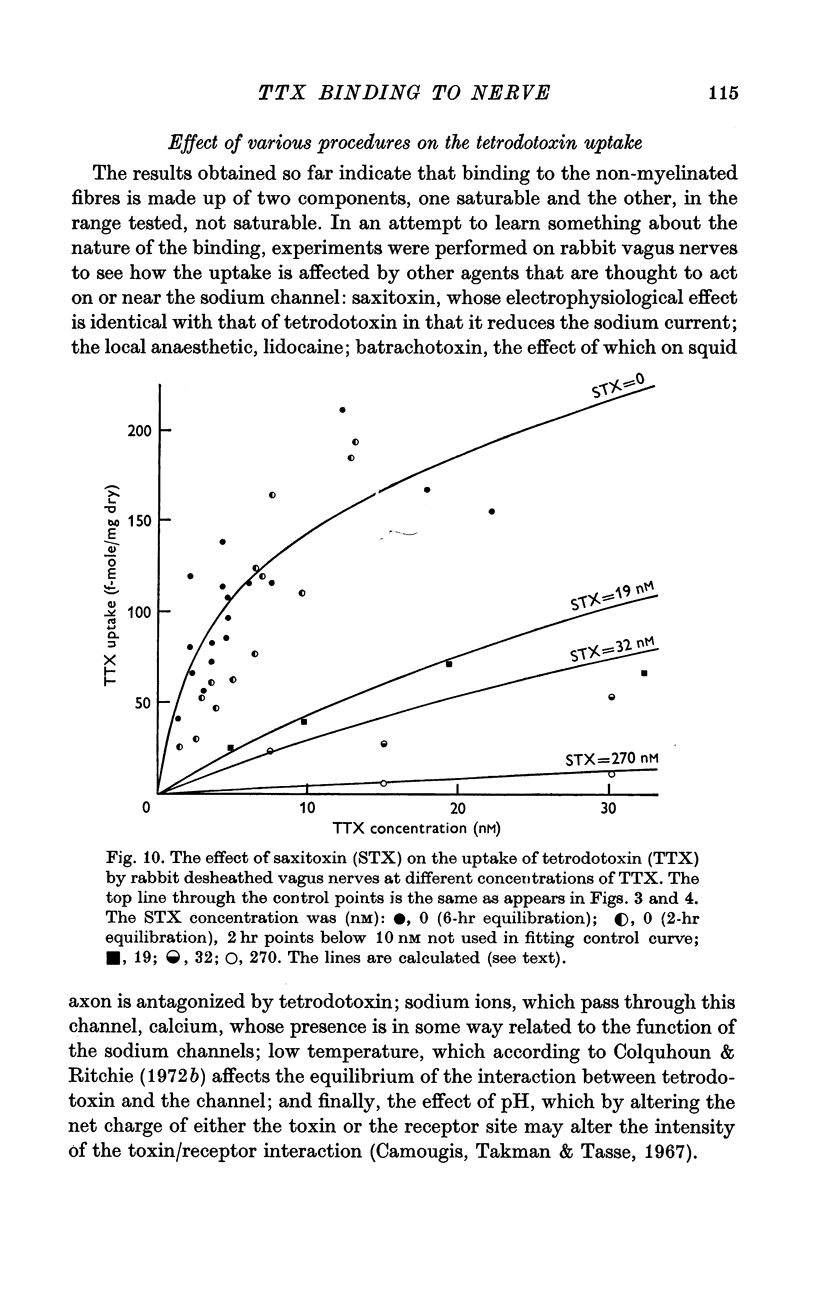
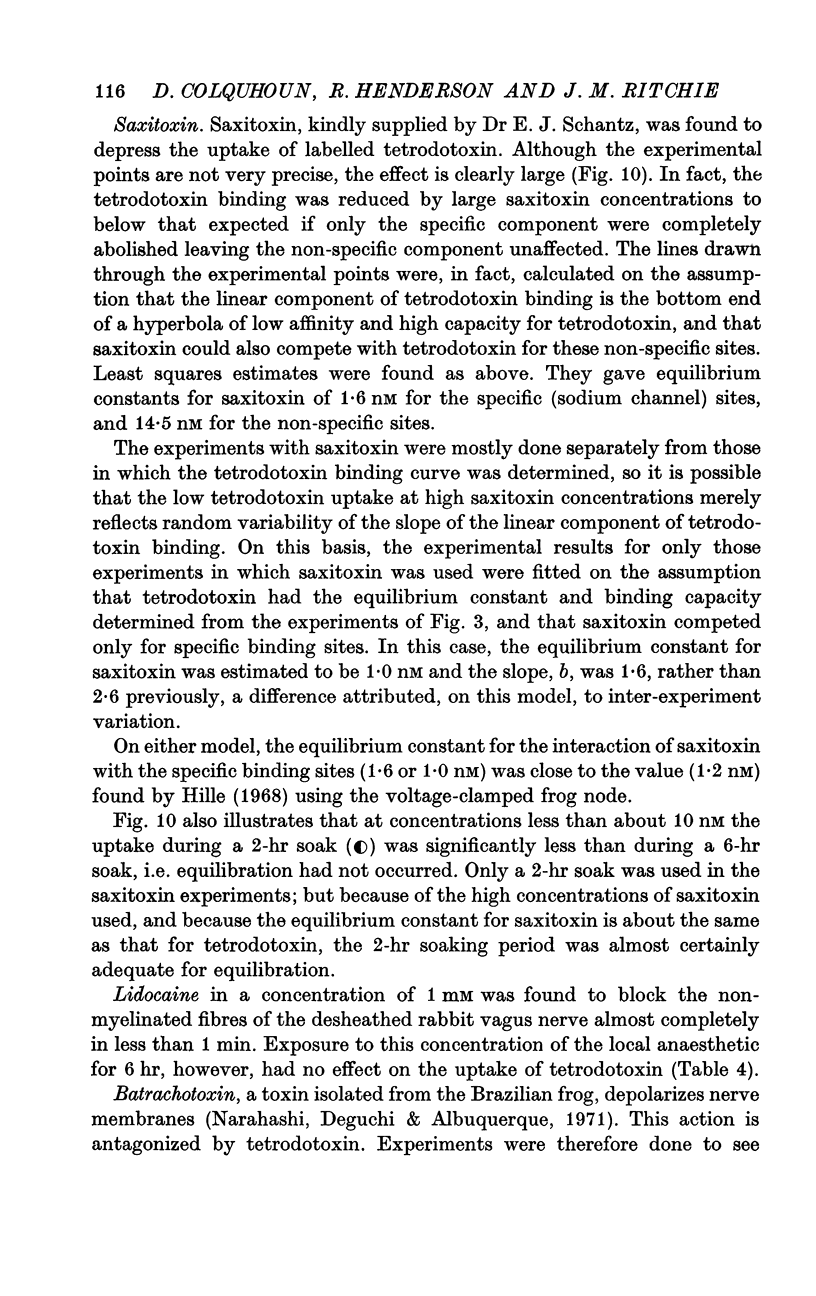
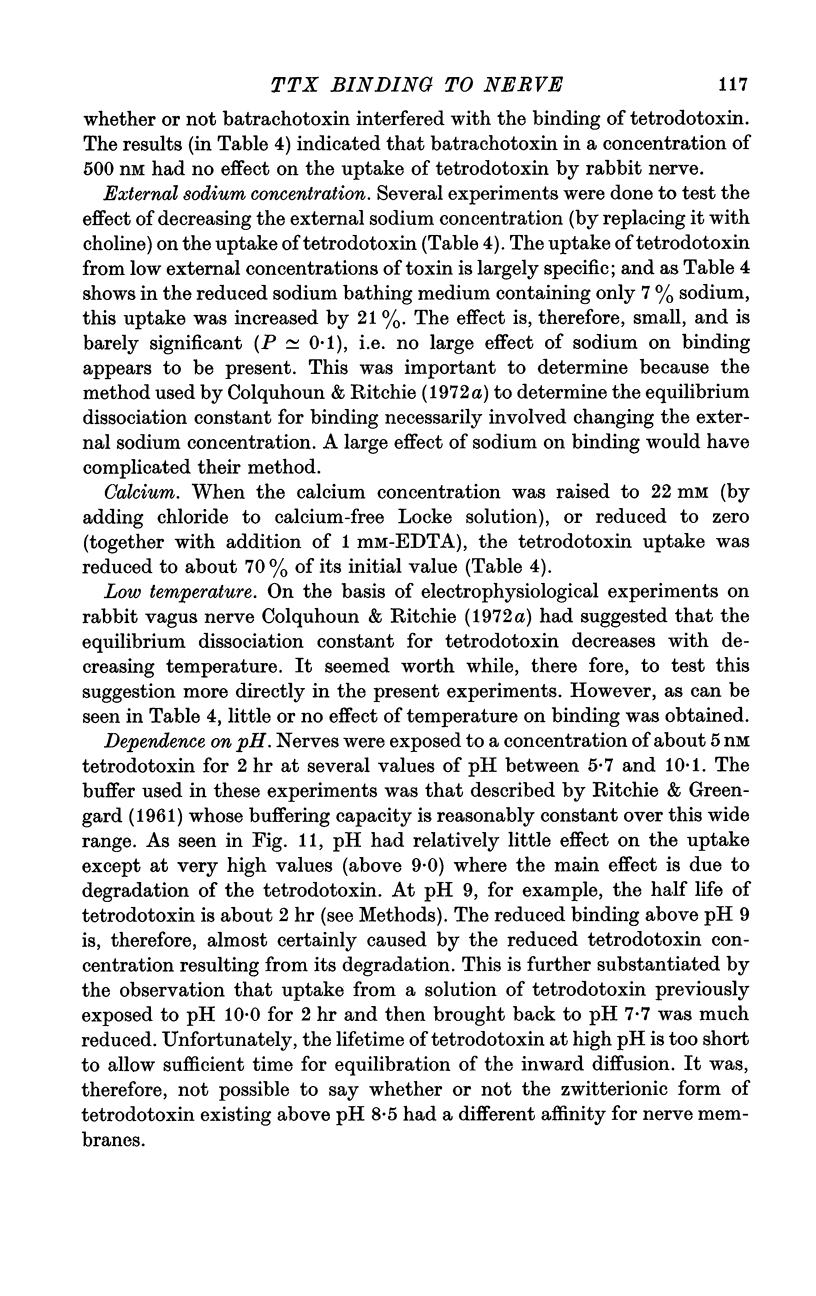
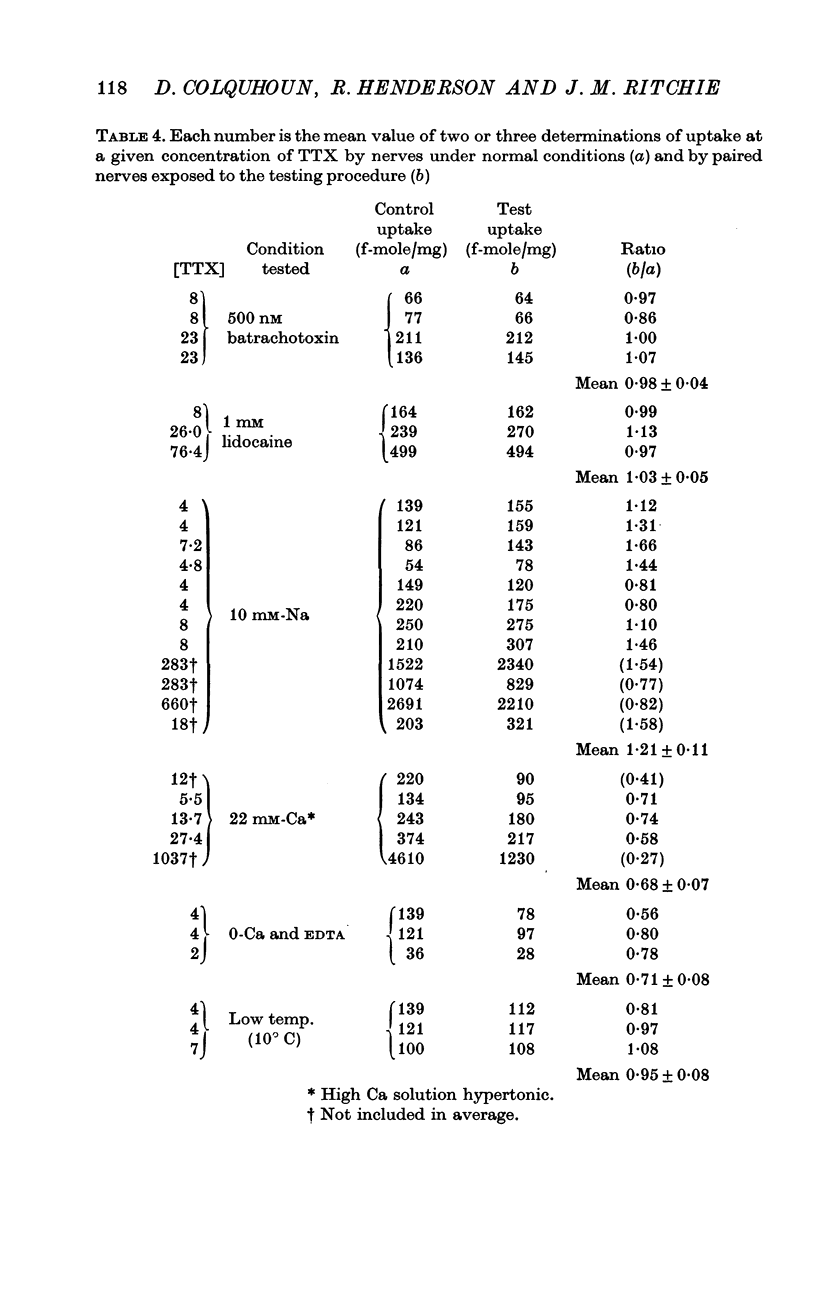
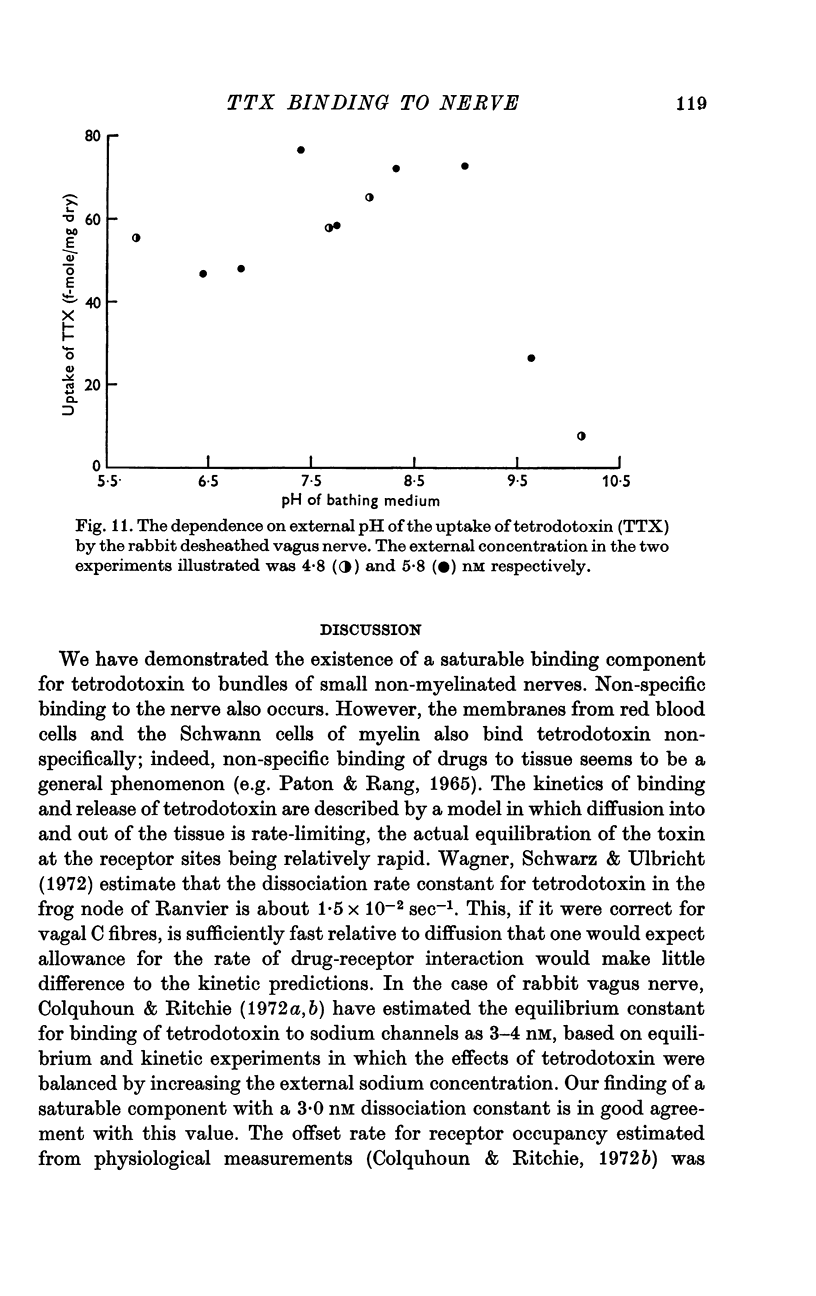
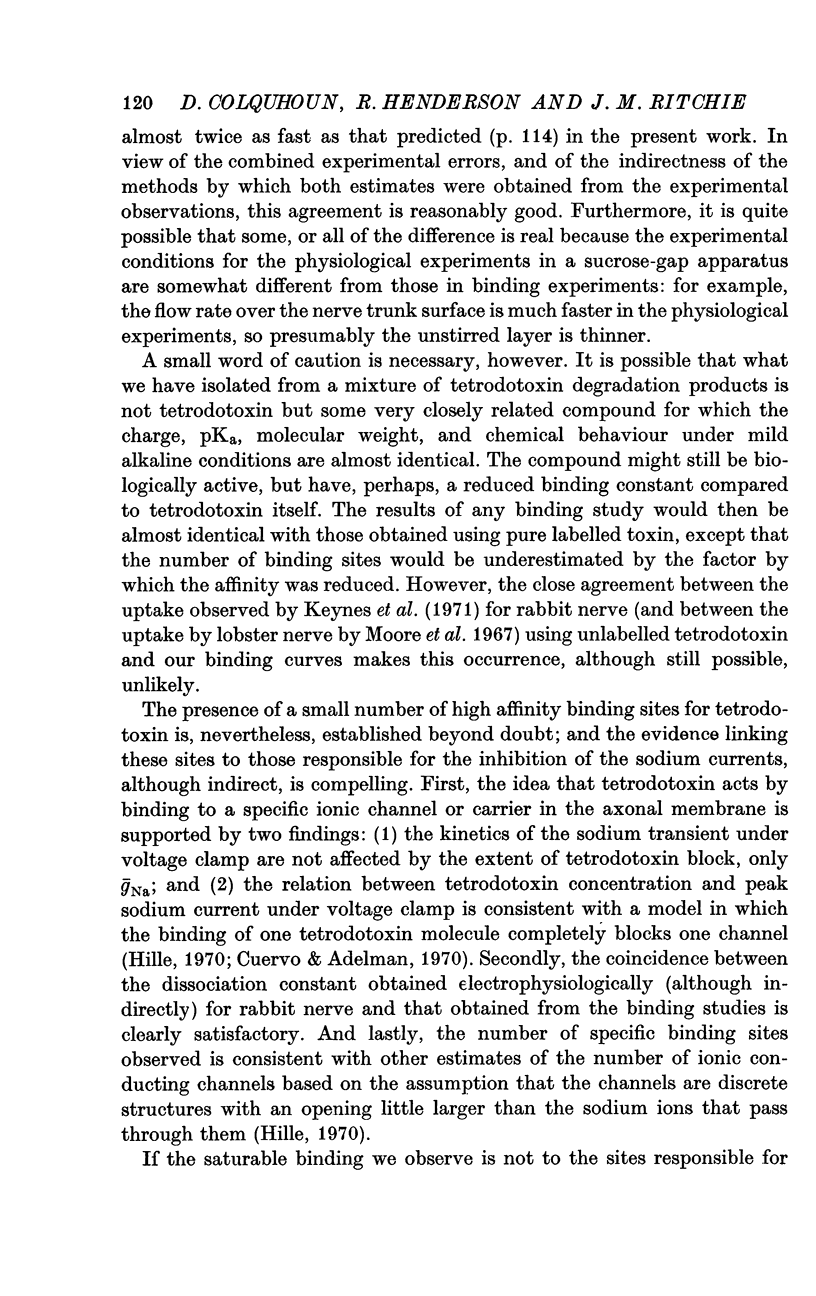
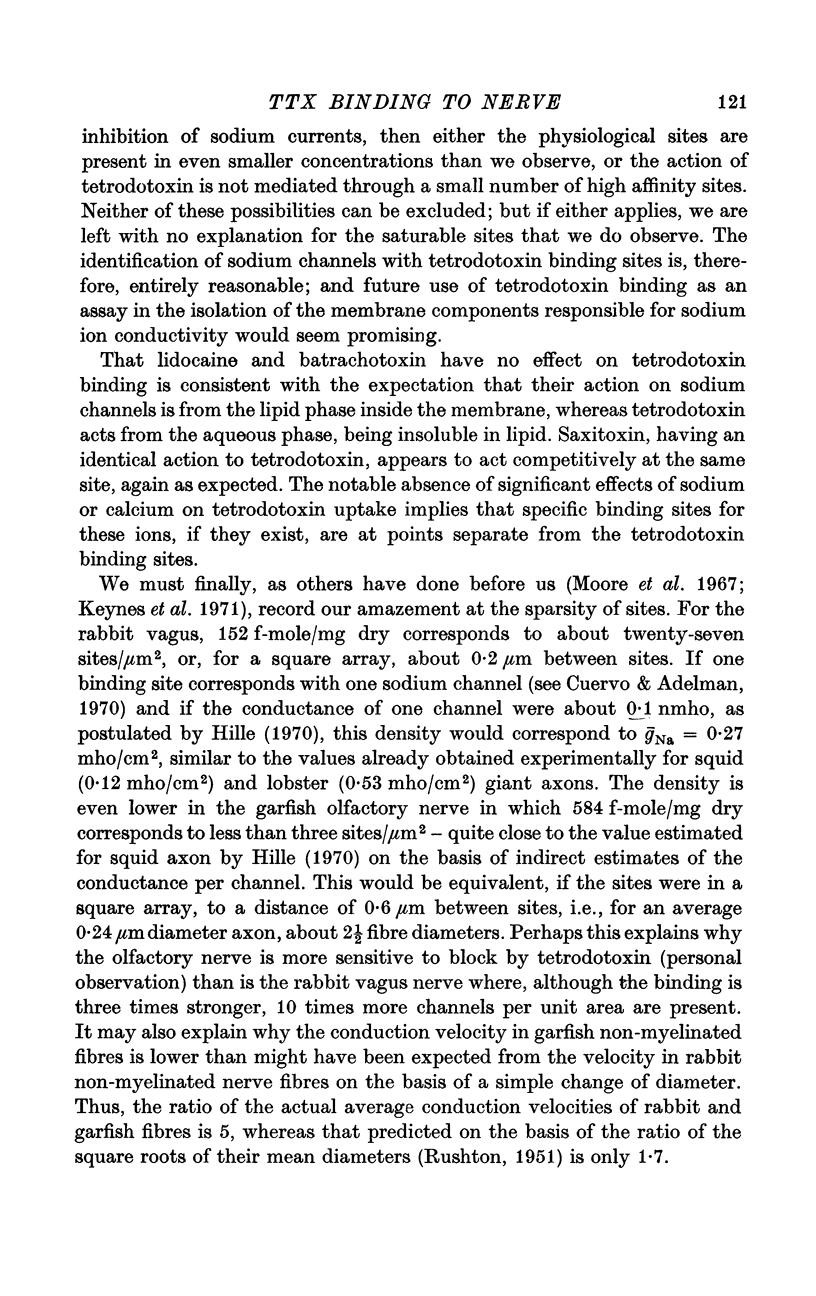
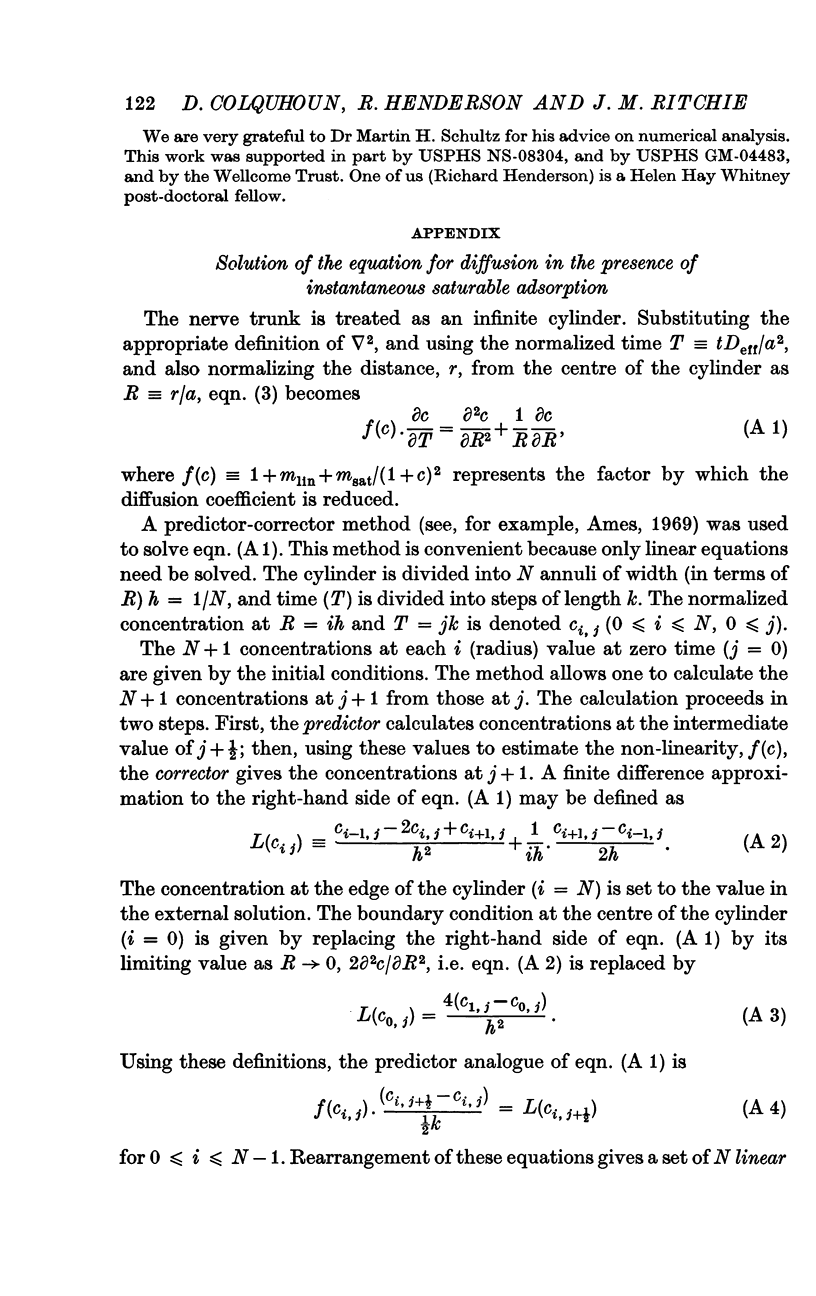
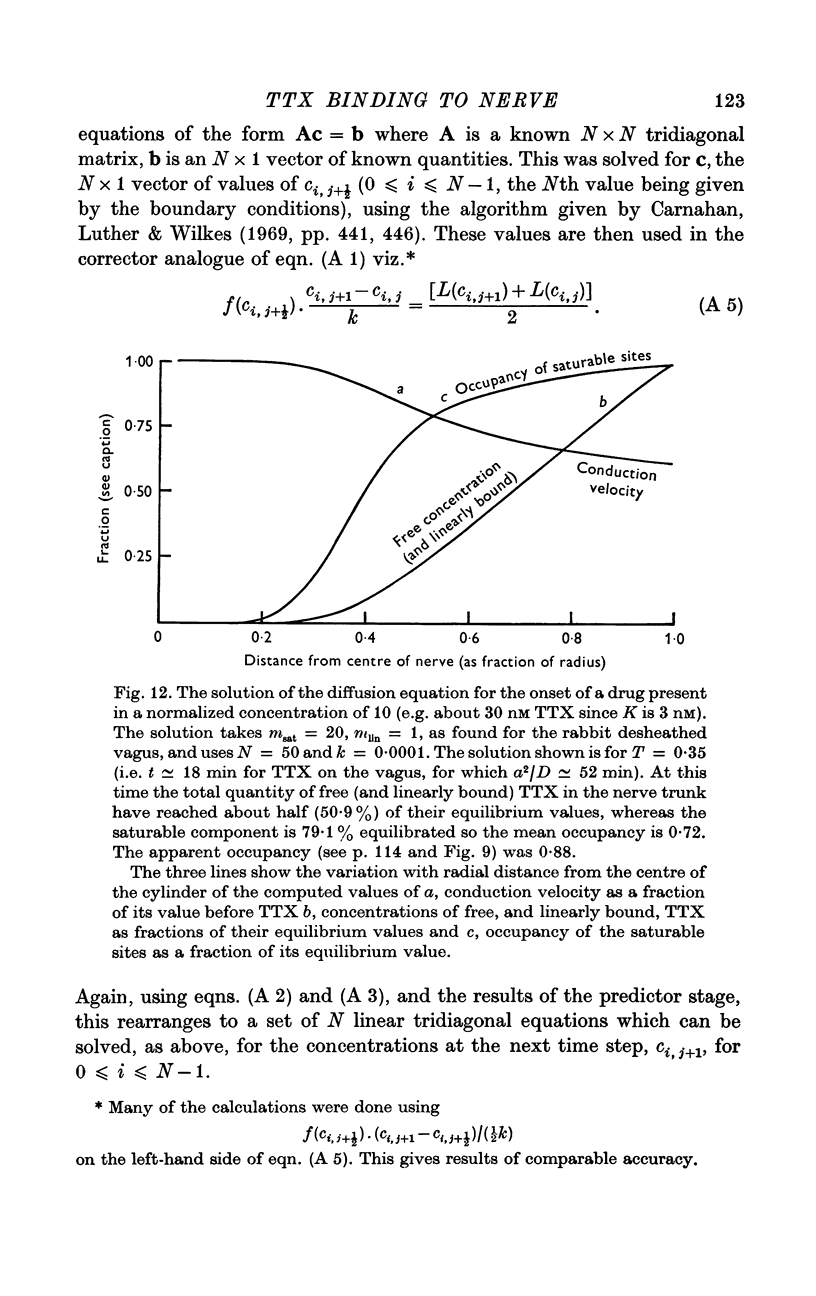
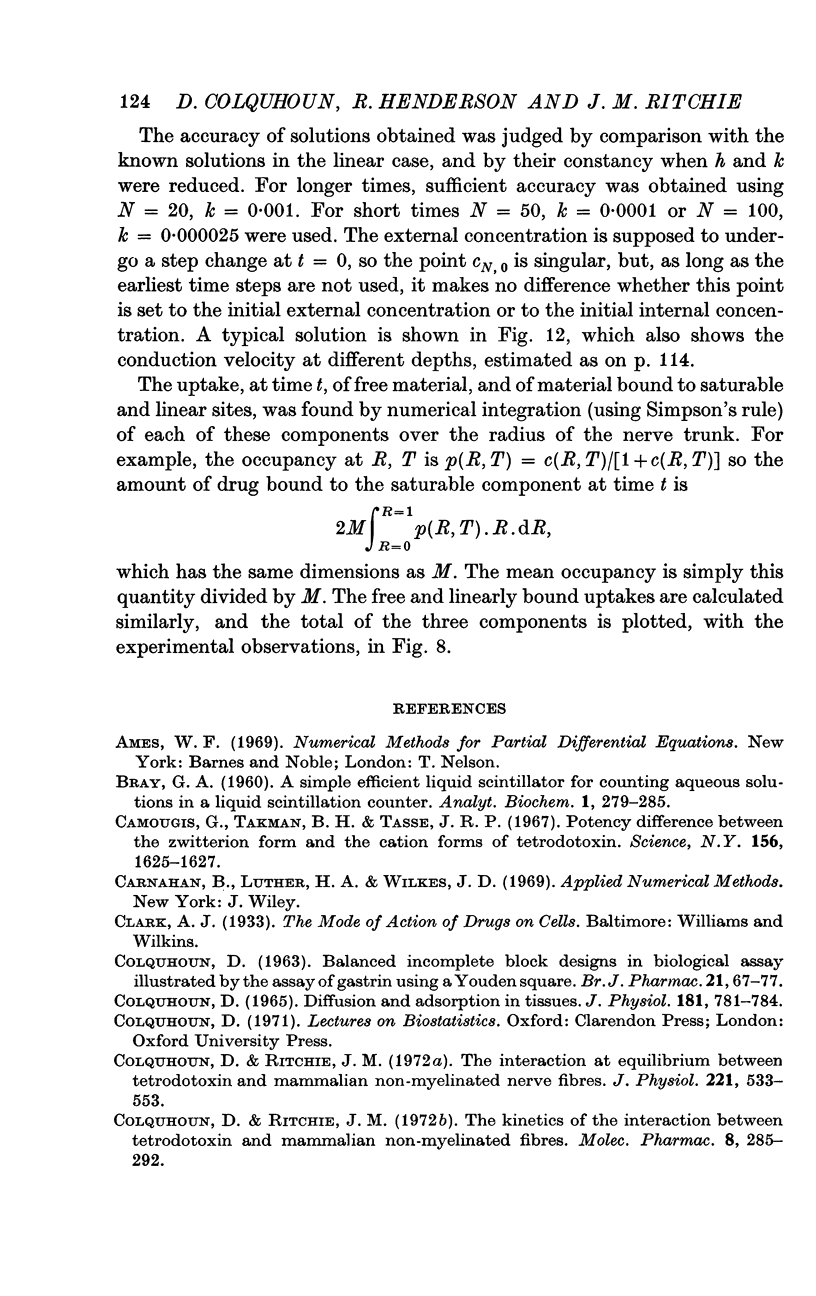
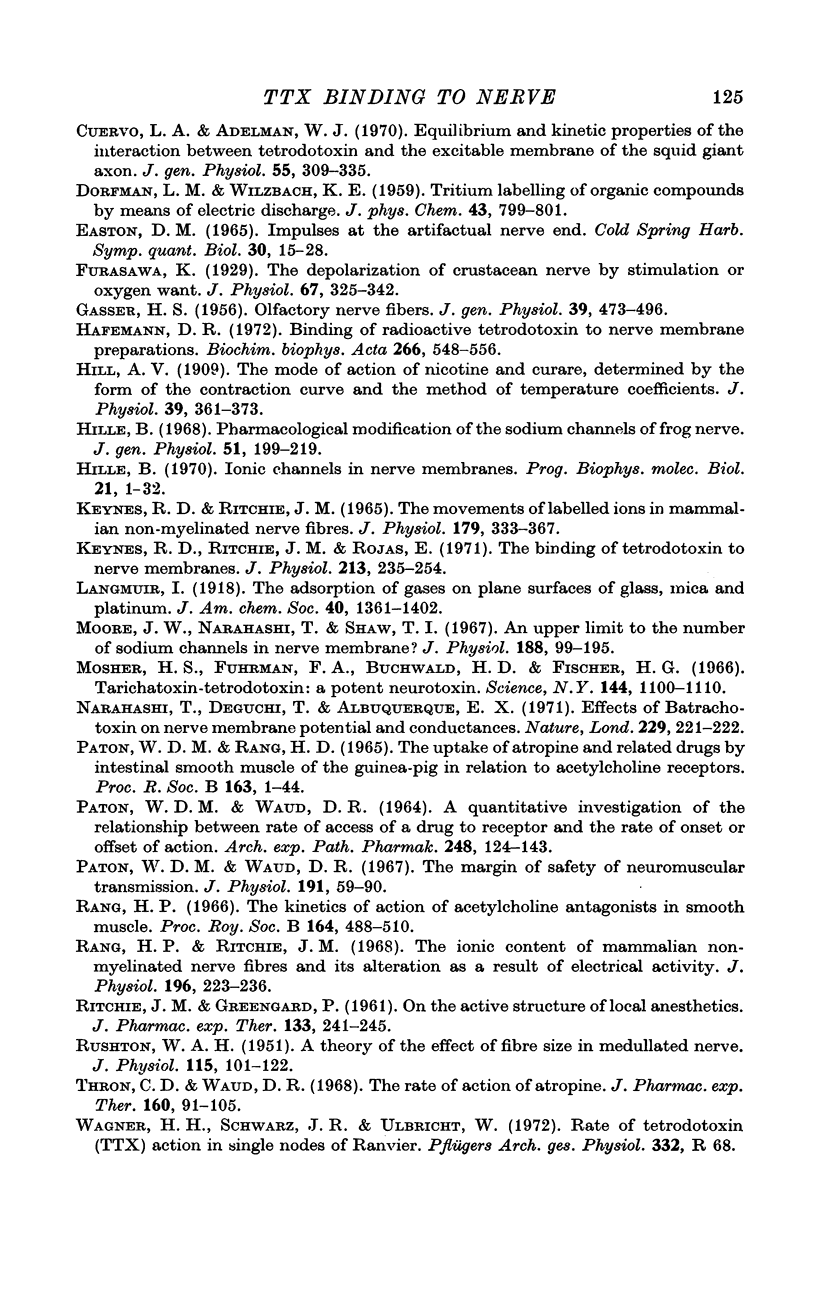
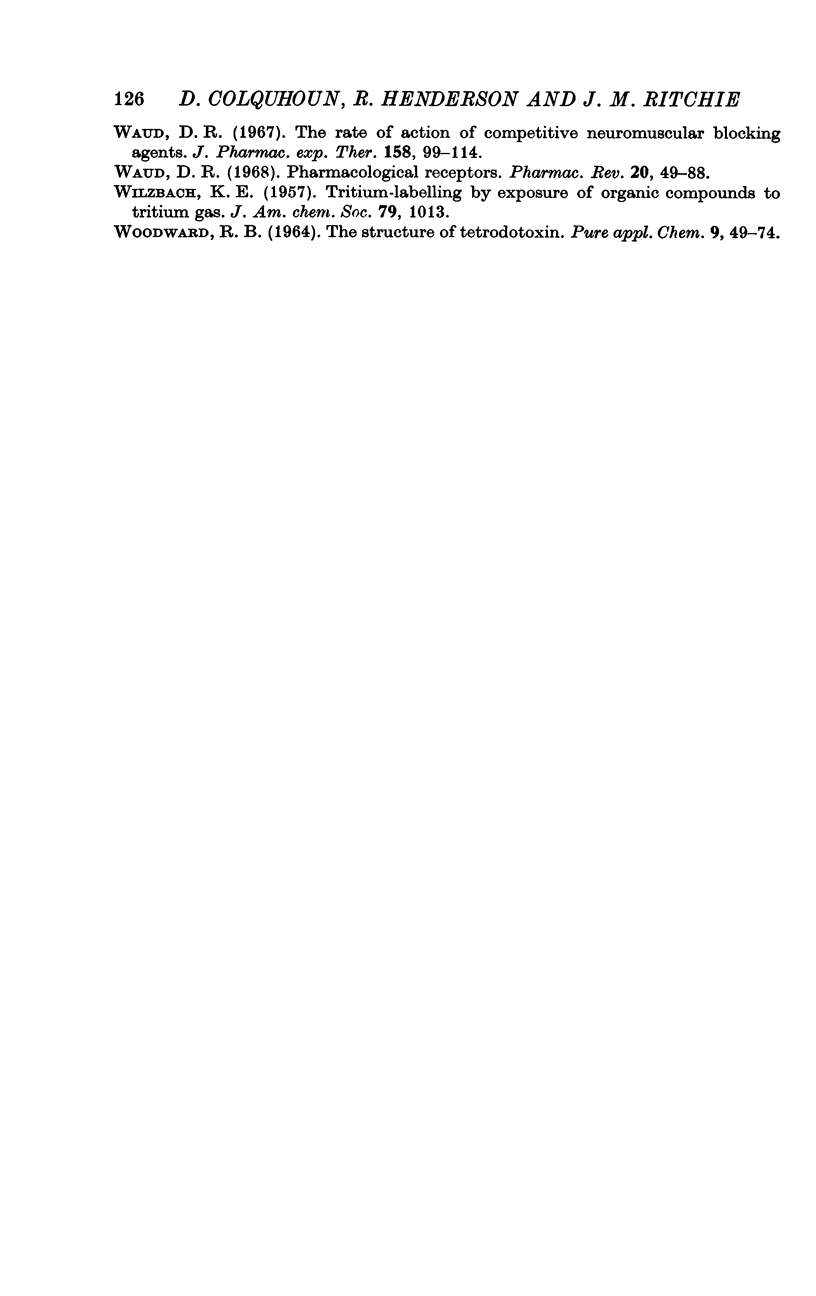
Selected References
These references are in PubMed. This may not be the complete list of references from this article.
- COLQUHOUN D. BALANCED INCOMPLETE BLOCK DESIGNS IN BIOLOGICAL ASSAY ILLUSTRATED BY THE ASSAY OF GASTRIN USING A YOUDEN SQUARE. Br J Pharmacol Chemother. 1963 Aug;21:67–77. doi: 10.1111/j.1476-5381.1963.tb01502.x. [DOI] [PMC free article] [PubMed] [Google Scholar]
- Camougis G., Takman B. H., Tasse J. R. Potency difference between the zwitterion form and the cation forms of tetrodotoxin. Science. 1967 Jun 23;156(3782):1625–1627. doi: 10.1126/science.156.3782.1625. [DOI] [PubMed] [Google Scholar]
- Colquhoun D., Ritchie J. M. The interaction at equilibrium between tetrodotoxin and mammalian non-myelinated nerve fibres. J Physiol. 1972 Mar;221(3):533–553. doi: 10.1113/jphysiol.1972.sp009766. [DOI] [PMC free article] [PubMed] [Google Scholar]
- Colquhoun D., Ritchie J. M. The kinetics of the interaction between tetrodotoxin and mammalian nonmyelinated nerve fibers. Mol Pharmacol. 1972 May;8(3):285–292. [PubMed] [Google Scholar]
- Cuervo L. A., Adelman W. J., Jr Equilibrium and kinetic properties of the interaction between tetrodotoxin and the excitable membrane of the squid giant axon. J Gen Physiol. 1970 Mar;55(3):309–335. doi: 10.1085/jgp.55.3.309. [DOI] [PMC free article] [PubMed] [Google Scholar]
- Easton D. M. Impulses at the artifactual nerve end. Cold Spring Harb Symp Quant Biol. 1965;30:15–28. doi: 10.1101/sqb.1965.030.01.006. [DOI] [PubMed] [Google Scholar]
- Furusawa K. The depolarization of crustacean nerve by stimulation or oxygen want. J Physiol. 1929 Jul 25;67(4):325–342. doi: 10.1113/jphysiol.1929.sp002573. [DOI] [PMC free article] [PubMed] [Google Scholar]
- GASSER H. S. Olfactory nerve fibers. J Gen Physiol. 1956 Mar 20;39(4):473–496. doi: 10.1085/jgp.39.4.473. [DOI] [PMC free article] [PubMed] [Google Scholar]
- Hafemann D. R. Binding of radioactive tetrodotoxin to nerve membrane preparations. Biochim Biophys Acta. 1972 May 9;266(2):548–556. doi: 10.1016/0005-2736(72)90110-1. [DOI] [PubMed] [Google Scholar]
- Hill A. V. The mode of action of nicotine and curari, determined by the form of the contraction curve and the method of temperature coefficients. J Physiol. 1909 Dec 23;39(5):361–373. doi: 10.1113/jphysiol.1909.sp001344. [DOI] [PMC free article] [PubMed] [Google Scholar]
- Hille B. Pharmacological modifications of the sodium channels of frog nerve. J Gen Physiol. 1968 Feb;51(2):199–219. doi: 10.1085/jgp.51.2.199. [DOI] [PMC free article] [PubMed] [Google Scholar]
- Keynes R. D., Ritchie J. M., Rojas E. The binding of tetrodotoxin to nerve membranes. J Physiol. 1971 Feb;213(1):235–254. doi: 10.1113/jphysiol.1971.sp009379. [DOI] [PMC free article] [PubMed] [Google Scholar]
- Keynes R. D., Ritchie J. M. The movements of labelled ions in mammalian non-myelinated nerve fibres. J Physiol. 1965 Jul;179(2):333–367. doi: 10.1113/jphysiol.1965.sp007666. [DOI] [PMC free article] [PubMed] [Google Scholar]
- MOSHER H. S., FUHRMAN F. A., BUCHWALD H. D., FISCHER H. G. TARICHATOXIN--TETRODOTOXIN: A POTENT NEUROTOXIN. Science. 1964 May 29;144(3622):1100–1110. doi: 10.1126/science.144.3622.1100. [DOI] [PubMed] [Google Scholar]
- Moore J. W., Narahashi T., Shaw T. I. An upper limit to the number of sodium channels in nerve membrane? J Physiol. 1967 Jan;188(1):99–105. doi: 10.1113/jphysiol.1967.sp008126. [DOI] [PMC free article] [PubMed] [Google Scholar]
- Narahashi T., Deguchi T., Albuquerque E. X. Effects of batrachotoxin on nerve membrane potential and conductances. Nat New Biol. 1971 Feb 17;229(7):221–222. doi: 10.1038/newbio229221b0. [DOI] [PubMed] [Google Scholar]
- PATON W. D., RANG H. P. THE UPTAKE OF ATROPINE AND RELATED DRUGS BY INTESTINAL SMOOTH MUSCLE OF THE GUINEA-PIG IN RELATION TO ACETYLCHOLINE RECEPTORS. Proc R Soc Lond B Biol Sci. 1965 Aug 24;163:1–44. doi: 10.1098/rspb.1965.0058. [DOI] [PubMed] [Google Scholar]
- PATON W. D., WAUD D. R. A QUANTITATIVE INVESTIGATION OF THE RELATIONSHIP BETWEEN RATE OF ACCESS OF A DRUG TO RECEPTOR AND THE RATE OF ONSET OR OFFSET OF ACTION. Naunyn Schmiedebergs Arch Exp Pathol Pharmakol. 1964 May 11;248:124–143. doi: 10.1007/BF00246668. [DOI] [PubMed] [Google Scholar]
- Paton W. D., Waud D. R. The margin of safety of neuromuscular transmission. J Physiol. 1967 Jul;191(1):59–90. doi: 10.1113/jphysiol.1967.sp008237. [DOI] [PMC free article] [PubMed] [Google Scholar]
- RITCHIE J. M., GREENGARD P. On the active structure of local anesthetics. J Pharmacol Exp Ther. 1961 Aug;133:241–245. [PubMed] [Google Scholar]
- RUSHTON W. A. H. A theory of the effects of fibre size in medullated nerve. J Physiol. 1951 Sep;115(1):101–122. doi: 10.1113/jphysiol.1951.sp004655. [DOI] [PMC free article] [PubMed] [Google Scholar]
- Rang H. P., Ritchie J. M. The ionic content of mammalian non-myelinated nerve fibres and its alteration as a result of electrical activity. J Physiol. 1968 May;196(1):223–236. doi: 10.1113/jphysiol.1968.sp008503. [DOI] [PMC free article] [PubMed] [Google Scholar]
- Rang H. P. The kinetics of action of acetylcholine antagonists in smooth muscle. Proc R Soc Lond B Biol Sci. 1966 Apr 19;164(996):488–510. doi: 10.1098/rspb.1966.0045. [DOI] [PubMed] [Google Scholar]
- Thron C. D., Waud D. R. The rate of action of atropine. J Pharmacol Exp Ther. 1968 Mar;160(1):91–105. [PubMed] [Google Scholar]
- Wagner H. H., Schwarz J. R., Ulbricht W. Rate of tetrodotoxin (TTX) action on single nodes of Ranvier. Pflugers Arch. 1972;332(Suppl):R68–R68. [PubMed] [Google Scholar]
- Waud D. R. Pharmacological receptors. Pharmacol Rev. 1968 Jun;20(2):49–88. [PubMed] [Google Scholar]
- Waud D. R. The rate of action of competitive neuromuscular blocking agents. J Pharmacol Exp Ther. 1967 Oct;158(1):99–114. [PubMed] [Google Scholar]


